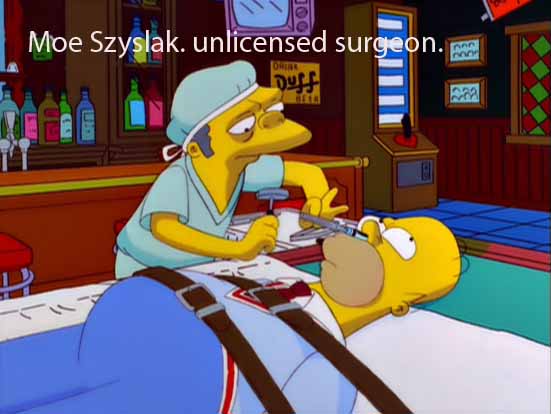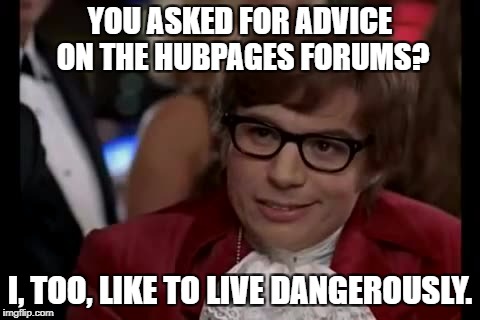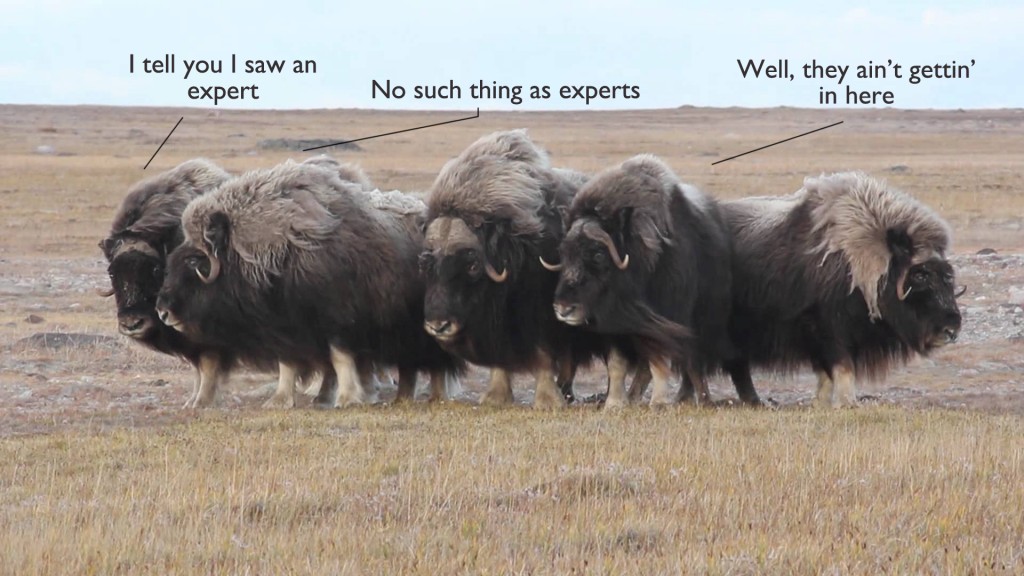Preview of New Feature Called Expert Reviews
In a very limited release (2 articles, that will expand to dozens in the next month or so) we are testing a new feature and process called Expert Reviews.
Our strategy is to satisfy Google and readers with high-quality content. Part of Google's webmaster guidelines discusses E(xpertise) - A(uthoritative) - T(rustworthy). We are aiming to increase the EAT of our sites, especially for Y(our) M)oney Y(our) L(ife) content. YMYL is especially challenging because to properly review, it requires very specific expertise that is outside the knowledge and skills of an everyday expert.
There are several challenges with this feature and we will work on improving it gradually. First, there is scale. It's time-consuming to find the right expert and to have them write a review - We don't pay experts for reviews. Reviews will need to be updated as articles change which is an added complication we are addressing. There are also a number of things to consider about the reviews. If a review says a treatment isn't safe, do we get more reviews (in the beginning there is one expert review per article, but we may add support if needed for multiple reviews) or do we remove the content? How do we handle negative reviews? An early case we have is a diet that says here is how to eat a very low calorie diet, but the expert review says it's not safe and quick weight loss is unlikely to be sustainable. The article is technically right on how to eat a very low-calorie diet - So far, we are leaving our rules in place regarding content (with limits, diets that aren't considered long-term healthy are allowed if the instructions are accurate). In cases like this, the Expert Review acts as a bit of a WARNING (sort of like what the surgeon general says about smoking on a pack of cigarettes), in it's very best we see Expert Reviews adding additional help for readers to improve the trust by having feedback from highly credentialed experts.
There are additional processes to improve between the procurement of the review, posting it, and notifying the authors as well as handling author questions.
This a very nuanced feature that we will iterate on quickly. Please provide feedback in this thread and we will follow along as we work to improve the EAT for our sites and hopefully add to the long-term success of our sites.
https://pairedlife.com/problems/Best-Wa … -TreatmentInteresting idea, needs much scrutiny. I wonder, have we already passed the through the era of the expert? Or is the concept still viable in Google's eyes? Having expertise and authority is one thing, but the trust factor is crucial. How is this best established? I can see where you're coming from - the niche sites have been so successful, you want to build - you could experiment with the EAT idea in one specialised area, give it a time test and try and gauge success or not.
Experts, so called, come in many shapes and forms. There is the scholarly, the qualified/experienced and the 'instant' expert, who has usually come down the route of personal experience, especially with regards to YMYL. In other words, they are not professionally qualified, they only have personal experience to offer, backed up with minimum research. I suspect that these instant experts are many in number on HP. Any articles of this nature would need long and careful evaluation by those who truly know the subject matter. TRUST is all important in this respect.I feel that the inclusion of an Expert Review in a Hub can result in chaos, in that the commenters in the "Comments" section already are likely to agree and disagree with one another as well as with the Hub Author, and the Expert Review may create another layer of argument. -- The Expert and the Hub Author may disagree, both on solid research grounds (especially regarding the newest research), and the Comments commenters can then take additional sides in a melee of posts.
Right now, if I saw "Expert Review" on a Hub, I would not read it. However, increasing numbers of Americans like to watch a fight - in sports, on TV, on Twitter, and in other online posts. Will this increase readership and along with it, income? It might, but I don't like it.I see several problems with this in addition to what others here have written.
If an author has numerous hubs online and one is negatively criticized, people will choose not to read any of the others because they will no longer trust what the author has to say.
Furthermore, bias almost always comes into play with this sort of thing, so if the "expert" has a bias that is opposed to what the author says, it may look like the author was incorrect, but this may not be the case.
It seems to me that what you are trying to do here is make up for the fact that most writers here are not experts. You cannot have this both ways. You either need writers who may not be experts but know a lot about a topic or are willing to do good research, or you have to dump all of the writers here who do not have "credentials" and make this a site for experts.
I believe the way out of this is to forget the "expert" reports completely but have writers expand their profiles to show that they either ARE experts or have plenty of successful experience in a particular field.Perhaps this feature isn't going to extend itself to everyone. I could be wrong. I share the same concerns albeit criticism is good for some things..like disarming nonsense. I use HP as a way to stockpile written works like a portfolio for future jobs. Unless these criticisms are imbued onto the articles themselves, we can make whatever use of them we can. I don't care who or how many people read my articles. I write for my own educational purposes. And it would be nice if every once and a while someone comes along and says "Hey, it's not so much x, but x,y, and z. Here's some resources". That sounds helpful. But then again, who knows what this will look like.
Isn't that one of the reasons to have a comments section?

Moe Szyslak
Alma Mater:
School of Life
Qualifications:
Bar Keep
Therapist
Unlicensed surgeon
Hobbies:
Polishing his brass neck
Trying anything once (as long as he gets paid)
Mapping all available exits
I bet Moe has a few accounts here, lol. And his comments would be pure gold.Moe leaves comments on my hubs all of the time. Thank goodness he has not been hired to provide expert reviews. (At least not yet!)
Talk about a non sequitur

I repeat, why can't the comments section act as the checks and balances to a writer's opinions and factual assertions? The alternative of ONE 'EXPERT' offering a supportive or detrimental conclusion just about closes down any arguments and will make or break the article and its writer, whether or not the 'expert' is correct or not.
Let the 'experts' make their comments in the comments section, which is what it is there for in the first place, where they can be debated. And get those misleading 'expert reviewed bylines' off the top of the article.It is only a non sequitur if you miss the point, lol.
This debate is about a lot of different things but 2 of the most important are:
a fear of being judged (by an expert, in this case)
a resentment of experts, in general.
The latter has a lot to do with people who really care about the world they live in, are intelligent and want to contribute to debate and be helpful to others but were denied the education they needed (for one reason, or another) to fully participate.
In other words, there are a lot of sincere wannabe experts on this site as well as quite a few cynical Moe Szyslak's.
The problem with wannabe experts is they are prone to getting stuff wrong which is not helpful for visitors who have serious real world dilemmas.
The notion that everything is a matter of opinion and every opinion is equal is plain nonsense. Real experts have earned the right to get their views noticed among the crowds of wannabe's and readers should not have to wade through acres of half-baked nonsense to get to something sensible.And there you are missing the point completely. By a mile.
No-one on this thread has expressed a fear of being judged. The fear is that the person doing the judging will be given the power to completely negate the article. Any expert opinion can be just as easily expressed in the comments where it can be agreed with, or debated. As is only right and proper.
Resentment occurs when self-proclaimed experts are seen to get it wrong. Time after time. As many of us have demonstrated here. There are certain universal laws that never change so cannot be argued. Yet, 'facts' tend to change and morph all the time. Things that were accepted 'facts' a decade ago are now, shown to be not facts at all. Factual information is often not factual at all. Even when there is consensus.
The main points under discussion here--and read them carefully; they are the most important--are:
1. The expert review is being thrust upon hubbers without them being asked if they want to submit their work to review, or even being told when it is a fait accompli.
2. The expert's name appears above the writer's, and is given more importance.
3. There's no facility for the writer, or anyone else to respond directly to the review.
4. The reviews that we've seen so far have been pretty dire, and mostly personal opinion. They have been refuted by other hubbers who also have relevant qualifications.
Now, if you can address these points, Will, instead of making it about imaginary 'fear and resentment', that would be more useful. We all realise that you are playing Devil's advocate, and that you enjoy trying to wind people up, but why not give your attention to the very valid points raised in this thread instead of making us all out to be intellectual half-wits who are living in fear of our writing being judged?Okay, just to move to another aspect of what this debate is about:
Writers and websites have a responsibility to readers. The feelings of writers are secondary.
What actually matters is that the information contained in articles is accurate and supported by evidence of some, named kind. Any opinions offered by the writer should be framed as exactly that -- opinions. Countervailing opinions need to fairly presented so the reader has a fair picture of the subject and can make up their own mind about what is valid for them.
Pretty much every other approach is unprofessional.
The 'expert review' thing is unwieldy as it stands but it could be amended to help support valuable writing --especially if writers could acknowledge their anxieties, decide they want to develop professionally and make readers needs more important than their own.
Anyway, time for sleep...So you aren't going to address the points I made at all.
No-one is talking about feelings, Will. And, as I mentioned in my other reply. HubPages is a collection of sites for mostly amateur writers. It's not a site for publishing academic research. It's not an accredited medical site. It's somewhere to post some articles and earn some money.
Writers don't have a responsibility to their readers. Not here. Sorry, but they don't. Readers have to take responsibility for their own actions, as do we all. Of course authoritative sites, like the NHS in the UK *DO* have a responsibility, but HubPages writers - nah. If I read something in the newspaper or a magazine, it's my choice whether to take their advice as gospel. Same goes for here. It's a magazine site. It's for entertainment. If it happens to be educational, enlightening, or promotes further investigation, so much the better. However, writing here does not need to be reviewed, in the same way that writing in the Daily Mail, or Cosmopolitan, or Fisherman's Weekly isn't reviewed.I agree with the views expressed by theraggededge
This is NOT and never will be an authoritative and accredited site re the topics where HP wants to introduce reviews - there are others who do it very much better for very good reasons - they are qualified to do so.
All that HP is trying to do is make a site which is under threat from Google more acceptable to Google.
It's not going to work for a number of very good reasons - which have been detailed at length - none of which are to do with people feeling hurt because their views are being challenged.
Moreover it's actually more likely if implemented on the basis of the present methodology that Google will kick HP even harder because it breaches one of the cardinal rules of Google i.e. do not be misleading.
Well said theraggededge!
Will Apse has COMPLETELY MISSED THE POINTS MADE BY THE MAJORITY OF CONTRIBUTORS !!!
Is he trying to qualify to become an expert reviewer? i.e. demonstrate an ability NOT to read what people have actually said....I'm aware that I am not an expert in anything these days, lol. Being aware of one's strengths and limitations is pretty important if you want to produce worthwhile work in any area.
Tame that ego. Be prepared to learn.
My first instinct, having read the "Expert Review" is "Really?!?"
I have a few problems with this particular example.
The most glaring issue is that the response of the Expert Review is difficult to read. Most of the people visiting PairedLife for advice are laymen looking for easy-to-understand advice for their problems. This expert has used academic jargon that makes my head spin, and I've studied psychology at the university level. This might sit well with Google, but it's not going to help the readers. Maybe I'm old school, but I like to think that what does well for the reader will still help more in Google.
Second to that, the use of one set of double quotes inside another set of double-quotes literally makes the passage difficult to read. Visually, this is glaring and obnoxious (not to mention improper grammar, to the best of my knowledge).
And finally, I back what others have said: The expert has taken the article out of context and has commented in a way which in no way supports the content of the article. The original author of this article spoke specifically about situations in which the silent partner went on for days or even weeks without speaking to the offended partner. This is not the same thing as "I need a time out" and therefore this adds nothing at all for the benefit of the reader.
What good is search engine traffic through Google if the reader doesn't stick around enough or trust the ads enough to click on them by that point?OK. I am going to skip the obvious problems with personal morality, bias, or slant based on pure opinionated voices, for all writers are accusable of this from the moment word is put to page. If the world readership has not found a solution to plagiarism, which is not always clearly plagarism, then this probably falls into the same line of reasoning. I will briefly try to break down the problems of EAT as I see it. And I am probably far from an expert.
E(xpertise) - Being an expert and being a critic or reviewer are far from the same. Many experts criticize others in the same field for philosophic or stylistic issues, but these criticisms do not invalidate a person and their legitimate experience. In the world of art, many people have founded an original and ground breaking style, but have not formal training, experience or anything that makes they an expert in any traditional sense. George Orwell was an expert in literature and grammar, but is 1984 an example of this, or is it a novel that is more revered for it's non-legitimate expertise in reworking our thinking about society? Does this make Orwell an expert novelist or a social anarchist? Expertise is not alone something that can qualify or disqualify anyone from having a legitimate opinion. The consumer who tries a product and finds a flaw or safety issue, they are not an expert, but they are as valid about that product and it's usage, as the people who make it. That is my best attempt to express this first point.
A(uthoritative) -
Well authoritative maybe just another way of saying persuasive. On the search engines, something can appear authoritative that is just manipulative keywords, online presence and follower rhetoric. Authorities even in the law must be open to the wider interpretation of the law, as it becomes defined by society and the people. Even the dictionary must revise itself every so often, so that word definition does not become abstract, but is based on the current usage and legitimate ways language is a construct in society. 'Ain't' may not be a legitimate word to some language scholars, but it is widely used enough in the world, that the dictionary was persuaded to add 'Ain't' to the dictionary. Now the publishers of modern dictionaries had the authority to do this or not do this, most opted for the non Doublespeak progression of language archiving and now 'Ain't' exists in the modern dictionary as a fully legitimate word. Therefore authority doesn't mean being untouchable or unpersuadable by new or provisional evidence to what may seem contrary information. I think being authoritative maybe a misnomer in this instance. It certainly does not get my vote, when it comes to critical reviewing of an article.
T(rustworthy). Unless you are going to put all writers under the microscope to the nth degree, come one...who can pass the test of absolute trust worthy information exchange or writing online. Fact checking even catches the big networks, TV and news of misinformation all the time. Fake news, real news, everything online in some form is entertainment not face, do not fool yourself. Being trustworthy is not something that can be enforced in a giant double blind experiment like the Internet. Transparency, honesty, faith?...come on folks we are not children here. How do you know if I am even a man or a woman writing this, trust worthy is a state of belief, and a fantasy based on believing you know things about reality that you do not, at least when it comes to the legitimacy of someone writing online. Especially for as little as most of us on Hubpages get paid. Do you trust me, as I am writing this? Well I don't care and you shouldn't either. Take that and publish it on your FAQ page HP.
And for the rest of you.
Keep on Hubbing...
I reckon whatever subject you tackle you need to be aware of the current state of knowledge and the opinions of those who spend their lives dealing with the issue professionally. This might take a little research.
If you want to take a different tack to an established consensus or come down on one side or another of a controversy, you need to say why. Or your contribution is not worth much.
A lot of writing is about framing stuff. Say what want, but don't expect much respect if you cannot place what you believe in a wider perspective.
This is how human cultures proceed.
One thing is clear, the kind of review provided in the example here will turn readers off. They won't trust the article and in all likelihood be turned off by the tone of the review. People looking up something on such a subject are looking for help and an expert is not necessarily helpful. At the same time, someone with a good understanding of the subject, with no credentials, are often liable to provide exactly what the reader needs.
I understand the motive of making the niche sites better in terms of what Google wants but I see these reviews being counter-productive - driving readers away from an otherwise helpful article.Paul, it's obvious from Jellygator's response to the expert review that she wasn't even aware her Hub had been reviewed! Surely you are not going to add these reviews to our Hubs without notifying the author?????????????????????????????????????
Obviously Yes - given the resounding silence on that point!
Like I said elsewhere in this thread I was very perturbed that a site which had an author who apparently had NOT been active for a while had been chosen as a "guinea pig" in this exercise.
There's been no comment at all since then as to whether or not authors are notified.
Google has a nice tool which allows people to report sites / pages etc which they find misleading. I think if I had created a site and somebody else decided they could include content on the page I had created without my say so, then I might want to have a word with Google about that.......
.....before I removed the content to my own site where I can be safe in the knowledge that somebody who has not read my content and is not competent to comment can be described as an expert reviewer with their name above mine in the credits at the top of the articleThis is among the most troubling aspects of this, to me. Why would authors not be informed when a (potentially negative) review is added to their Hub? That's a pretty sneaky thing to do, and I really hope that's not the plan.
Authors need to be able to trust HubPages. It has always seemed like that is important to HP as well, and I hope that isn't changing.I agree this doesn't look good, but I am willing to give HP the benefit of the doubt at this point. I'm hoping Paul or another staff member will comment sooner or later. I do not believe HP would intentionally make writers look like fools or undermine our credibility.
Sometimes ideas don't pan out and need to be scrapped or revised. Sometimes things that seem like good ideas turn out to be bad ideas. Sometimes the community reaction makes a difference. HP has always been willing to listen. Somebody obviously listened to the comments in this thread and changed the review on jellygators Hub.It does not look as though revision of this plan is in the works: Reviews have been added to several additional articles without taking into consideration the feedback from the community. For example, the name of the expert continues to appear above the name of the author on all hubs which have been 'reviewed.' This is arguably the most catastrophic point because it is so misleading to the reader. Credibility of Hubpages and all niche sites will likely drop if it is not clear who wrote the articles in question.
@Everyday Miracles, you are right. I feel as though we're getting the mushroom treatment. They've created this thread and they're going to let us all rant till we're exhausted, then they'll just carry on regardless.
What really concerns me is that we haven't heard from any of the Hubbers already affected by this. Do they even know the reviews exist? The author of the original Hub, Jellygator, didn't even seem to know the review existed, so it worries me that these reviews could appear on my Hubs without warning.It's ironic that we are getting the silent treatment discussing a hub about silent treatment.
Haha!
Paul has just answered on another thread that yes, the authors are notified and get to communicate with the editor about it.
https://hubpages.com/community/forum/14 … their-hubsMore importantly, he has said that the whole expert review thing is a work in progress. So, they probably noticed the feedback.
A very wise man once told me 'Assumption is the mother of all f* ups.'
Instead of assuming they've 'probably noticed the feedback', I've put a request on Marisa's new thread for Paul to come back here and comment. If there's no word soon, I suggest we all start emailing Paul and the team. That way we can be 'certain' they'll have noticed the feedback.They said it was a work in progress right at the start, so that's not news. What we're looking for is some sign that someone - anyone - is even taking our feedback into account when considering how to make that progress. Right now, it feels like they're not.
I didn't get told about the expert review until it was done. no one consulted with me. they added their own links. the only communication i got was after it was done and they did another pro edit to my article. They changed the whole feel of it.
I assume, considering some poking around and some of what I've read here, that HP has chosen hubs written by authors who have not been active writers on Hubpages for some time. Therefore if they are notified of the changes to their hub, they aren't likely to be checking in with the process involved in the addition of the expert review. I'm going to have to keep an eye on my own hubs, but I have so many e-mail addresses that I'm not sure notifying me via e-mail is the most effective way to reach me. Are hubs which have been reviewed marked on the dashboard?
It concerns me a great deal that HP had to be asked to comment here in another thread given that Paul stated in his post in this thread that they have read every comment multiple times. If that's the case, the request that they check in (which you posted in the aforementioned thread) ought to be redundant: We've been asking for comment for some time.@Everyday Miracles, I assume you've seen Jellygator's response by now - she had no idea the review had been added! I find that deeply worrying.
The question of whether or not this is a free-for-all writing hub is finally taken to task. I've only been here 6 weeks and have yet to figure out what's actually going on here. It's not exactly clear what the vast majorities motivations are in publishing here. Criticism can be helpful for narrowing the scope of the truth but it can also be too heavy handed in a domain that may have once been thought of as laid back and light spirited.
Although there are many things HP does well, I am not a fan of this feature.
I hope these authors were given a heads-up about this experiment and thus had a fair opportunity to update their respective articles before they were publicly maligned by the same organization that publishes their work. I also hope the authors were given an adequate preview of the expert opinion and a chance to either participate or not in this poorly executed experiment. Authors should have the final say regarding whether such experts appear in their articles, just as we do with comments.
Note, too, that experts OFTEN disagree. The academic literature (and scientific progress in general) is built on this notion. Even in court, there are very expensive p*ssing matches between "hired guns."
Just as an author uses beta readers and advertisers and other organizations use focus groups, HP must explore possibilities WITH authors rather than execute an idea then see what happens. Doing so will result in fewer "hit or miss" experiments as well as fewer hard feelings.
While the idea behind this experiment is laudable -- increase respectability and Google love using external experts -- how it was implemented needs substantial improvement. Alternatives that I can think of just right off the top of my head might have included:
1) make an expert available to the author so they can quote them directly within the body of the article, using the expert's name, credentials, etc. Even if the expert disagrees with the author's approach, the alternative perspective appears. Readers often like alternative approaches or perspectives when thoughtfully and respectfully presented.
2) have the expert provide primary citations to the author so that s/he can update the article. Experts should be able to easily cite their sources.
3) just as medical articles on respected sites are "reviewed and approved by (insert physician's name here)" if HP has genuine concerns about certain topic areas, explore that formatting further. On medical websites, those reviewed & approved articles don't have lengthy comments by the medical reviewers and they don't confuse readers as to who the author is. Expert names are small and not the focus. It's about respect, clarity to the audience regarding who wrote the piece and working with authors behind the scenes to achieve a satisfactory outcome. (Do you want commenters to think they're going to get their questions answered by the expert or the author? Be super clear about roles.)
4) Submit the expert opinion to the comments section if you must so that the author can approve/deny, and answer it.
5) If HP is determined to pursue the current format, then provide multiple expert opinions so the author can select the one that is most appropriate and least offensive.I am the author of the article that is mentioned in this thread as the sample. I'm honored that you selected this one to test on - thank you!
I didn't see the first review, but I have seen the second one. It strikes me as argumentative and designed to minimize the author's credibility. I believe this will have two considerable impacts:
1. I suspect that authors would be reluctant to have many reviews like these, where the reviewer tries to discredit the writer. I know I had a much different response to the "review" than I do to reader criticisms where I feel I can respond to the criticism being offered. I believe I would have been more receptive if the review had been in a right float capsule that was a side note to my article. Instead, if seemed the review hijacked the top line AND the final word of the piece I spent a lot of time putting together from my training, my experiences, and from other supporting resources. (It's especially annoying in this case because while I am fine with differing opinions, in this case the reviewer's comment specifically has the potential to cause more harm to victims of emotional abuse.)
So - would I continue to write if I can expect this to happen to my articles? Probably not.
2. The other potential problem I see with this is that it can confuse readers and leave them with less clarity or purpose due to receiving conflicting information. They presumably are reading because they want to hone in on something or seek a solution. There are times when people want to expand their minds, but when it comes to relationship articles and how-to guides, people generally want someone to give them something understandable. By bringing in extra viewpoints, it just confuses readers and makes the source unreliable. I think it's undermining credibility.
Possible Solutions:
1. Have multiple expert reviews per hub so that the reader feels drawn into a conversation rather than an argument.
2. Allow the author to have a single response to the review in case a reviewer has failed to understand something or is simply mistaken about something that the author has a source to support their original claims.The original review took a similar position but erroneously suggested that there was no evidence to support the statement that the silent treatment is emotional abuse. Clearly a particular group in the world of psychology would support your perspective.
The first reviewer suggested that withdrawal from a relationship can have a positive side even it was an example of poor communication. The reviewer characterized certain kinds of silent treatment as a sort of time out.
I find your article hard going because it lacks basic definitions. What is 'the silent treatment'? What is emotional abuse? What is narcissistic personality disorder? None of these things are uncontested.
For example, 'narcissistic personality disorder' was very nearly excluded from the latest 'Diagnostic and Statistical Manual of Mental Disorders' (the handbook/bible of the American Psychiatric Association) because many psychiatrists do not believe it actually exists. It was eventually retained but in a very different form.
https://www.ncbi.nlm.nih.gov/pmc/articles/PMC3071092/
By taking the very worst perspective, and denying the possibility of more benign interpretations, you are essentially telling troubled women that they are living with malignant partners when that may or may not be true.
Also, addressing women, only, is very unhelpful, given the title of the article. Men are more likely to suffer emotional abuse than women according to some studies like this one: https://www.ncbi.nlm.nih.gov/pmc/articles/PMC3876290/
Quote:
'Younger men reported experiencing higher levels of emotional abuse, which declined with age. Older females reported experiencing less emotional abuse than older males.'
All in all, your article lacks clarity, fails to provide context, or overview, and seems no more than a personal polemic. I see it as an example of catastrophizing.
And if you want a definition of catastrophizing, here is a simple one: Catastrophizing is an irrational thought or belief that something is far worse than it actually is.
Something to avoid, when addressing people who are suffering.I've been on Hubpages for eight years, and my articles run the gamut from perfectly personal hubs about my thoughts on everything religious and political (ironically, my views have changed entirely and this moniker no longer suits me. I've been unsuccessful in changing my "main" account on Hubpages to reflect, as this is how I am known here) to scientific explanations of a shooting star (and that's just this one account).
Over the years, the quality standards have changed (shall we say "improved?") and the expectations have changed along with them. It appears that Jellygator's article was written five years ago, before the recent standards were put into place.
(I do not in any way mean to say that Jellygator's article is sub-standard, only that when it comes to the reliability of information contained within, it was written during a time when opinion-based pieces on Hubpages were still more popular than they are now).
I suspect -- strongly -- that this is the reason that this article was chosen. It's an older article written by an author who has not been as present as some others may have been. Jellygator was an easy target for this experiment.
If there are changes which ought to be made to the article, I am of the opinion that this is a poor way of going about it. Experts would get nothing at all out of being asked to review the article and send feedback to the author, however. Their "reward" (if they are not being paid for this) is their name (prominently) on the article.
I agree with Jellygator: This is contentious and argumentative rather than helpful in its current format. We reduce our own credibility when we are required to disclaim our articles (such as "the following contents are the opinion of the author), but it seems that may be the only solution to making it clear to the reader that we aren't (all) professionals in the field about which we are writing.
(For what it's worth, I agree with you. The topic at hand is manipulation, and with further definition could clarify the point. As you stated, women are more likely to manipulate men than the other way around. However, as my ex used "the silent treatment" to punish me for piercing my nose many years ago, I can attest that men do use the silent treatment to either manipulate or punish their partners.)
This feature looks very interesting and I can see how it may help increase Google's ranking overall of HubPages.
I was surprised, however, on the selection of the first test hub, since it did not keep up with latest requirements: It has no author bio, it still has right-floating capsules, and the author name is not a real name as Google prefers (especially for YMYL subjects).Y, the selection process we more about the various types of experts we wanted to see if we could reach and get reviews back than specific articles that are super polished to show it off. We will do some others with different criteria that are more polished top to bottom.
@RonElFran - It's a good idea to use a real name on content like this for sure. There are a number of things to consider about the placement of the review. The main goal is to increase EAT and add value for the reader.
We will share other reviews as things progress.I am looking forward to seeing more examples. I'm sure you've been following this thread and can see the anxiety this particular example has created.
My big concern is that when (as in the example), the Expert Reviewer says "this Hub is rubbish", then the reader will immediately bounce back to Google without reading the Hub - meaning the bounce rate will go through the roof.
Of course, my other big concern is HubPages' ability to choose the right expert. You'll have seen on this thread that TWO well-qualified psychologists, who happen also to be Hubbers, feel the "expert" in this case is unaware of the current state of research in the field, and her review is wrong.
Likewise, I've been doing a lot of research on intermittent fasting lately, and I am shocked at the outdated advice given by one of the dietitians on the Caloriebee Hubs.
A couple of observations:
When I first looked at the sample article, I took the designation of the expert reviewer at the top of the page ("Nicole Prause, Ph.D., Psychologist, Associate Scientist") as referring to the author of the article. I only realized my mistake when I wanted to look at the author's profile.
The real author is listed as "jellygator." The disparity in authority between "jellygator" and "Nicole Prause, Ph.D" is mind-numbing, especially since the review is somewhat negative. I'd advise strongly encouraging writers whose work will be subjected to expert review to use a real name or at least a professional sounding pen name.Hi Ron, I am the author of it and I don't know how to add a real name because when I signed up for HubPages, "jellygator" was just my sign on name and my actual name was at the bottom of each of my articles, where I had my copyright statement as well. This hub was written quite a while ago, and HP has had many changes to formatting and methods since then.
You're right about the disparity!
I think I would agree with Glen and Ron that the format of this needs to be looked at more carefully to make it clearer. Maybe the expert reviewer can "respond." As far as getting reviewers, you might want to have Hubpages authors apply for an "expert reviewer" status in particular categories that they have credentials or expertise. Then you could funnel hubs to them for review. This could work well if you have 2-4 reviewers in a particular area and they could pick and choose what to review. Maybe you could have more than one reviewer. Perhaps this could be a special part of the comments section? Just an idea.
@VirginiaLynne Thanks for the suggestions. I like the "Response" idea. We would love to have a group of experts that we could streamline the process for getting and updating reviews. We have some ideas, but we also don't want to overwhelm folks with requests. We think that as we develop more contacts and a deeper pool of reviewers this will be possible (i hope).
It's really nice to see features like these being introduced here. I like it very much and have visited the article suggested above just now to look at the content and the Expert Review. The article is good even though it doesn't tally with the amended rules of HP. But, I am not satisfied with the expert review. I think silent treatment is not a temporary behavior or tactic adopted by a partner. It can be very destructing to the other party if not checked within a certain duration of the time. I have gone through such circumstances and experienced many problems while both of us indulged in such practices for longer durations. So, I hope some more expert reviews should be taken.
But, I am happy to see this feature introduced and agree with some of the suggestions made by other hubbers below this thread.I have to agree. What the expert was describing wasn't "the silent treatment". It was more like an elaborate version of the age-old advice to count to 10 in order to calm down and avoid lashing out. The clue is in the name and especially the word "treatment". It's something done deliberately to punish the other person. Like most people, I've been on both sides of the silent treatment, giving it (shameful, I admit) and receiving it, and I know exactly why I was doing it or in most (but not all) cases why I was receiving it. It's destructive behaviour, and is NOT what the expert was describing.
On the lighter side, I came across something in the book "Men are from Mars - Women are from Venus" (I think it was that book) where some women hand out the silent treatment to their husbands, but the husbands misunderstand and think it's a reward of some peace and quiet for a change.
But the valid point, as also raised by lobobrandon, is how expert is the expert?True. The expert's own credentials and achievements also matter much when he expresses some opinion here. He should have solved many cases and achieved positive results. I don't think the expertise offered by the expert in the article of any value in solving the cases positively.
This is the expert:
https://en.wikipedia.org/wiki/Nicole_Prause
"Nicole Prause
Residence Los Angeles, California, United States
Alma mater Indiana University Bloomington, VA Boston Healthcare System, Harvard University
Known for Studies on sexual addictions, orgasm physiology, and biosignal processing
Scientific career
Fields Sexual physiology and biotechnology
Institutions Liberos LLC, Mind Research Network"
I reckon you should assume she is competent to comment.Yes - She's certainly an expert in her field with impressive qualifications as the review makes clear. And everything she says is no doubt true - a valid and useful strategy to re-establish communication. But there must be a better term for what she's describing than "the silent treatment" because everybody knows that "giving the silent treatment" isn't a way of calming the situation. It's a weapon. It's done intentionally to punish and to prolong the situation. Like the reaction I got when I gave my wife a birthday gift of a sturdy, handsome brush for sweeping the chimney. Now THAT's the silent treatment. That wasn't a case of "I am starting to become upset and need to take a time out. I will check back in 1 hour," It was a clear case of revenge and punishment. OK - just joking about the brush to make a point... honestly.
Maybe the meaning of the phrase "Giving the silent treatment" isn't as universal as I thought, in which case I'll retract my objection to her use of it - but I'd be very surprised if that's the case. As I mentioned earlier, what she's describing seems to be an elaborate version of the excellent, age-old advice of counting to ten (or ten thousand) in order to calm down and avoid lashing out, which is very different to giving the silent treatment.I'm not getting into a discussion of the silent treatment, lol.
Going back to the topic of this thread, though...
I reckon HP has to work with what it has in terms of writers, some of whom are not especially aware of their limitations or know the difference between their opinions and a fair representation of reality in the light of current knowledge.
HP also has to get traffic and income to survive. And it has to satisfy Google that it is kosher to acheive that.
Doing all of these things at once is not going to be easy. Tough editing will alienate writers who are not really professional enough to cope with criticism. Lax editing will mean the sites are a quagmire of ill-considered assertions with the potential to be harmful to a visitor's well being.
Overall, I'm not sure about this expert review thing as a viable strategy but it certainly shows staff understand the problem and are working hard to fix it. Writers that can muster the humility to listen could learn a lot from expert commentary, too.
Let's hope the whole thing means something to Google's algos in some way.I don't even understand the basic editing I see, and the "threat" of being unfeatured for quality. There are plenty of featured articles, (and yes, including several I've read on the niche sites), which have between them all, a multitude of typos, grammatical and context errors, (the ubiquitous "there" instead of "their" is common), misspellings, and mistakes that make it painfully obvious that English is not the author's first language.
How did these articles slide by the stated rigorous QAP to be featured in the first place, and the supposedly even higher standards for being moved to a niche site?
Meanwhile, I still struggle with editors who cannot make up their minds and all get on the same page with something as minor as whether or not to capitalize 2-letter words in titles.
No matter which way I do it, they come along and "fix" it to the other way. A waste of time, IMO, which would be better spent weeding out the aforementioned and more egregious errors!
Shouldn't staff be cleaning up these sorts of things before worrying about bringing in outside experts?I agree, DzyMsLizzy. The editors break there own rules over the APA issues in Titles and I see so many wrong ones yet. I also get corrected all the time for being right and they want changes. All the letters in a title shouldn't be capitalized. But I've been told that, and it's untrue. This niche business is nice, but is getting out of hand.
Indeed! Their focus on silly little formatting issues bespeaks a mindset of making molehills into mountains, and vice-versa, as well!
I took journalism in high school, and we were taught that words such as 'but, for, the, and, we, us, me, my, it, its, ' etc. (with the exception of the personal pronoun, "I"), should NOT be capitalized within a title.
I cry "foul!" and "unfair!" to changing horses in midstream! (wry grin.)
I don't really see where being an expert on "Sexual physiology and biotechnology," qualifies this person as an expert on "The Silent Treatment." It seems more like psychology than physiology.
I've met plenty of incompetent "experts". Sometimes I suspect they churn out PhD's for the tuition and fees. I've also met plenty of people with no official credentials who would run circles around those with a degree and prestigious position. Some of the work I've seen by physicians makes me wonder how any of their patients survive. It's a massive assumption to think and say that someone with a degree and a great job is qualified. Sit and talk to them awhile you'd find out more.
I think Obama had a degree from Harvard and he left the DNC bankrupt and opened the door for the Clinton mob to destroy our last Presidential election. Oh, and my reference there is Donna Brazile, former DNC Chair and also former expert on CNN.
One of the things I found funny about this "expert" review, and someone else pointed this out, was the misuse of quotation marks. We are expected to trust a review from someone who can't use quotation marks correctly or, at least, doesn't care enough to proof-read their own work.
As an aside for those worried about getting a bad review on one of their articles; I have for a long time made sure I've had the option to move an article to one of my own sites. It's advisable to have alternatives. This is definitely a case in which I'd use the option of moving an article to my own site; I could use the content elsewhere anyway. Nothing against HP, but when the options dwindle, you gotta do what you gotta do.
In all fields of study, there are a plethora of opinions on various topics, from experts. Academics are free to disagree on various topics and often do.
Well, I'll certainly be sitting this one out. I know a little bit about everything, but nothing about anything.

Hahaha, para--sounds a lot like me; Jill of all trades, master of none. I know a little about a lot.
 On some things, I know more than on other things, if that makes any sense.
On some things, I know more than on other things, if that makes any sense.
I suppose, though, I'll have to switch my pen name out for my real name. (I started here using my stage name, from the comedy improv troupe I was with.)
How will writers be alerted when an expert review is applied to their article, and will there be a time frame for making edits before it goes live?
I ask because, especially in cases where the expert disagrees with the article, it may be helpful for the author to have a chance to consider the expert's criticism, do additional research and update the Hub. That might eliminate some of the edits down the road, but I suppose it might also mean going back to the expert for a different review.
I don't really write very many YMYL articles, but I know if I had a review from an expert who disagreed with me the first thing I would do is start researching what they had to say. Then, assuming I agree with them, I'd go in and edit the Hub to reflect my newly learned perspective - which would mean their review is no longer accurate.
Possibly a heads-up and some time to edit when an expert review is going to be added would result in better overall information in the Hub, and avoid this kind of back-and-forth.This is a good point because I think I'd do the same thing. In fact, I would probably unpublish the Hub because the negative evaluation would reflect badly on the rest of my work and I'd rather lose the income from that Hub than have people think I didn't know what I was talking about.
I also think it would be nice to give people a heads-up. I do like the basic idea behind the Expert Reviews, because incorrect or outdated information damages a site's credibility and that hurts all HP authors.
Will HP be using Expert Reviews for hubs that cover art, history, literature, philosophy, and other topics? If so, IMO, those would have to be formatted a little differently because the way expert disagreement works in those disciplines is different.
I agree with points made by the previous posters: I think the formatting could be clearer and I also hope authors will have a chance to review/respond to an Expert Review. Perhaps such articles could include something like "Developed in consultation with Sally Smith, Ph.D., Expert Reviewer."
As an aside, I'm obviously new here and have a question about site etiquette. I read hubs in my areas of scholarly expertise that aren't necessarily flat-out wrong, but definitely rely on older, slightly outdated research, or fail to acknowledge legitimate scholarly controversies.
Is it acceptable for a fellow Hubber to point that out, and, if so, what's the best way of doing it? Obviously, it's a jerk move to post a comment with corrections, because that would do more damage to the writer's credibility that is deserved. Is it in keeping with HP's ethos to use the fan mail/messaging system in this fashion?Alexandra, I think the best way to alert another hubber about something that's problematical in their content is to send them an email by going under Fan Mail in their profile, and using the option to send them an email. IMO that's exactly the kind of thing that option is designed for.
Thanks so much for your reply. I've participated in communities where sending critique (even constructive) via private message/email was considered negative and inappropriate, unless you were an official administrator. I figured I'd better ask before I accidentally violated a community norm!
I think I'd prefer it in the comment section. I can either delete it or I can respond to it that way, giving readers a chance to see what was being discussed.
Jellygator, Paul Edmondson claims that authors are notified when an Expert Review is added to their Hub, and that they are able to consult with the editor about it. It certainly looks as though that wasn't the case for you.
I'm sure you haven't had time to read through all 14 pages of this thread, but rest assured that 99% of Hubbers feel that review is unjustified and unfair - and the first one was even worse! You even have three qualified psychologists who have posted on this thread to support you.
We are all upset enough that HubPages is happy to destroy the credibility of a Hub by adding a dubious 'expert' reviews, but adding them without telling us - that is just rude.Thanks, Marisa. I believe Paul when he says that authors are notified. I have nothing but respect for HP and the way they approach things. It has always been above board and they have normally taken our feedback into consideration, and I'm sure this is no exception. I don't review the emails from HP very often because I get up to a hundred emails a day, and these have dropped in priority since I resumed my career a couple years ago. Entirely my fault for not seeing it.
I don't agree, Jellygator. It may be your fault you missed it - but then the editor proceeded to post the Expert Review anyway, even though they hadn't heard back from you. Paul said this is supposed to be a process of consultation, and I don't think they should be viewing silence as consent.
Ah, I see what you mean now. I don't believe I gave any informed consent, but even then I'm not completely sure. I've truly been too busy to pay much attention to extraneous details outside of work and home recently.
I believe (as I've said) that this may be the reason that they chose to add these "expert reviews" to hubs written by seemingly inactive accounts. If silence is then implied consent, they are most likely to receive silence from someone who didn't read the e-mail from Hubpages.
In truth, it might have been the best way to do such an experiment. If they wanted to find out how this would work without the interjection of the authors they consulted, then experimenting on hubs written by authors unlikely to make a fuss seems logical, at least.
On the flip side, my guess is that hubs on these topics earn quite a bit. Authors will notice a decrease in earnings.
Sorry, that I've given you such a hard time over that article, whoever you might be (I honestly can't address a human being as jellygator, lol).
I see the whole narcissism thing as part of America's depressing plunge into pessimism, fear of others and lack of acceptance of human failings.
I don't think I am alone. This article appeared a couple of days ago, exploring the notion that millennials are dangerously narcissistic: http://www.bbc.com/future/story/2017111 … ot-so-fast
Two quotes in that article, both representing the views of reputable psychologists:
'young people today are more narcissistic and self-centred than in previous generations'
(Millennials are) “an exceptionally generous generation that holds great promise for improving the world”.
I think the obvious conclusion is that psychology is a collection of faiths (or perhaps philosophies). Science is pretty peripheral.
Personally, I still quite like humanity and I hate to see it run down, scared to death. divided, demonized or used as screen to project a persons worst imaginings.No need to apologize, Will. This forum is to evaluate the idea of having reviews. Despite the particular reviews on the article, I stand by the article I wrote, and my expertise level is not going to change based on a anything here!
I believe John Gray, author of Men are From Mars, Women are from Venus, was the subject of a great deal of criticism because he wasn't a doc with a bunch of letters after his name, but that non-expert has made an awful lot of money because he makes sense to a large audience, no matter what the experts say. Conversely, plenty of experts are quietly NOT influencing thousands of people. The stats on this hub show that it's being read pretty regularly. I believe my written advice must be standing up well to criticism, regardless of the individual here or there who takes issue with it:
Best Ways to Respond to Silent Treatment in Relationships Last week: 6,316 Last month: 27,943 Total views: 837,636 Published date: 06/17/12 Changed date (HP edit of some kind): 12/02/16Will,
I think people have been complaining about the up and coming generation since Aristotle's time, lol. Millennials insist they hate labels, but sure have enough of them. I am sure they will mature and find their way, just like other generations. We are all flawed.
Also, experts aren't above being able to cite their claims. If they did provide resources, it would be much easier to do a quick investigation and make changes as need. I, personally, like the idea of someone pointing out my errors because I pride myself on intellectual honesty.
How do you prove that these expert reviews are written by the people you say they are written by? I have no link to find out more about the expert. The least I would do is link out to their linkedin profile. There should be a way to prove that the review is true, how this could be done is something the community could probably discuss.
- Will Apseposted 8 years ago
0
Just to respond to that page example...
I would feel pretty cheated as a reader if I had read an article that began by asserting that 'the silent treatment is a form of emotional abuse' then at the end I was told by an 'expert' that "There is nothing to support" the claim.
As it stands, the page knowingly offers inaccurate information (according to the expert) of a kind which could cause serious damage to someone's relationship and/or mental health. This does not reflect well on PairedLife.
For me, the options would be:
Demand a rewrite of the page to reflect the range of professional opinion.
Frame the page as an opinion piece with disclaimers at the top.
Get rid of it on the basis that PairedLife would never knowingly mislead its readers, or put them through the ordeal of believing they are in an abusive relationship on the basis of unsupported assertions.
I would hate to try and generalize from that example, because it is a tough one.I agree with Will Apse. When HubPages discovers that there is nothing to support the claims made by a Hubber, they should ask the author to include references of proof to substantiate the claim, or to rewrite it with accurate content. In addition the hub should be unfeatured until the changes are made.
I feel strongly about this because I’ve come across a number of hubs on the niche sites that have totally inaccurate information. This is a bad reflection on the niche sites and only will hurt all of us in the long run.
Besides, adding a negative review at the end will only make the reader feel like he or she just wasted the time reading the article, as Will pointed out.Having read the article, and experienced this kind of treatment, I question whether this so-called expert knows what they are talking about. It seems like the expert's definition of silent treatment and the author's are two different things.
Somebody taking a break to cool off is a lot different than punishing a partner by shutting down and maintaining a hostile silence for days or weeks at at time.This is specifically one of the issues that I have with this "expert review." If the author and the expert are talking about two entirely different things, how does this benefit the reader?
For the moment, I will abstain from making a judgement on the matter; I'm not really sure how I feel about this, so am taking a 'wait and see' approach.
Great comments so far, and I strongly agree that inaccurate information shouldn't go unchallenged. Here are my thoughts:
The formatting is wrong. As Ron says, it looks at first glance like the expert has written the Hub. Any unsuspecting reader will be disappointed to find it's not by that expert at all (although the author may also be an expert). And as Will says, in the case of a negative review, I'd feel cheated if I read through an entire Hub only to be told by an expert at the bottom that I've just wasted my time.
In the example review given, the expert has completely destroyed that Hub. If I were the author, I would immediately unpublish it, even if I totally disagreed with the expert. Anyway, what's the point of a negative review? It's basically telling Google and readers that this Hub is not written by an (E)xpert, is not (A)uthoritative and is not (T)rustworthy. If that's the case, just unpublish it. Positive reviews by an expert, on the other hand, will certainly add value.
So, if the expert review is positive, that's great - it helps the author and the site and impresses Google.
If the review is negative, it hurts the author and the site and is basically telling readers and Google "Don't believe a word of this nonsense." The Hub (if the expert is to be trusted) should be unpublished.
If the review is part positive and part negative, then, like Wilderness suggests, the comments section is the best place for it (although not deletable if that's possible). In that way, the expert is not addressing the reader, but the author, who can then publicly engage with the expert if they wish. Remember, we also have quite a few experts of our own in various fields, here in HP including Ph.Ds.
Of course, the whole idea can only apply to objectively factual Hubs. Imagine trying it on a religious, political or climate change Hub.This. A thousand times this.
ETA: Silly thing isn't letting me quote?100% agree!!!
PLUS there needs to be a very clear and completely transparent (i.e. ethical) distinction between who the author is and who the reviewer is - and guess who should be the most prominent / named first?
I agree with what chasmac and some other people have said. In my opinion, the only expert reviews that should be visible to the public are ones that are positive. Reviews with criticisms should be shared in private with the writer so that they can either edit their article or explain why they feel that the review is inaccurate. If corrections to an article are needed they should certainly be made (and the article should be removed from public view if the problems are serious), but telling the public that the article that they have just read contains errors hurts both the writer's and the site's reputation.
- Beth Eaglescliffeposted 8 years ago
0
I like the idea of improving EAT to meet Google guidelines. However, I don't like the idea of using public "expert" reviews. I don't know how Google measures EAT, but it is unlikely they will have heard of many of the Expert Reviewers (with or without PhDs) that HP intends to use.
As others have said, a negative expert review should mean the article is unfeatured as it does not meet the required standard of balance and accuracy. Far better, in my view, would be to add a few external expert reviewers to the existing in-house editorial team. They can review the article behind the scenes and inform editors what defects (if any) exist. The editors can then make the decision as to whether or not the article remains on a niche site (or is unfeatured).I think this feature is terrible and will create a very unsafe environment for writers. Hubpages seems to be throwing their own writers under the bus by encouraging a random "expert" to criticize their articles. I do not understand how this is even being considered and disagree that it adds authority to the site.
I think it undermines the whole platform.
I think the only way this can work is if you seek out TWO Expert Reviews for each Hub - one that supports the Hub and one that refutes it. I say this because experts often disagree.
Let's take your example Hub. It took me only a few minutes on Google to find articles by respected psychologists who clearly disagree with your expert that there is "no evidence" it's a form of abuse.
https://schieffercollege.tcu.edu/commun … t-journal/
http://www.couplescounselingchicago.net … ipulation/
https://www.goodtherapy.org/blog/silent … on-0602145
https://blogs.psychcentral.com/therapy- … p-it-cold/
http://www.heysigmund.com/the-silent-treatment/
I'm not saying your expert is wrong - just pointing out that it's very, very common for experts to have differing and even opposing views on a subject. So it's incredibly unfair to completely discredit someone's Hub by adding a review saying "this Hub is total cr@p" (like the one in the example), just because you could only find an expert on the other side of the argument.
And by the way, very low calorie diets are another example of the fact that experts differ in their views. Twenty years ago, every nutritionist would have told you they were bad, but not these days.I have to agree that "experts" can be found on both sides of the fence. One example is when a scientific or psychological expert is called as a witness in a criminal trial, the opposition can often summon their own expert who supports an opposite conclusion.
This sums up my thoughts completely. The expert in this case has credentials related to sexual behaviour, not necessarily couples' counselling. And she obviously doesn't seem to take into account the passive-aggressive form of 'the silent treatment'. I think 'expert reviews' is a bad idea altogether. Especially when the one thing you can count on about experts is that they don't always know what they are talking about. I'd take a bet that this one hadn't even read the whole article before making her assessment.
If a hub is considered worthy enough to be moved to a niche site, then one of the editorial requirements should be that the writer provides sources for his/her claims. And that's all. There are good articles all over the web; we don't see expert reviews on them, and neither should we.
- threekeysposted 8 years ago
0
I think the era of "the expert" is over.
Probably most people who write at HP are not researchists doing the actual experiment and writing articles on their findings. Bringing in a "superior" diminshes initiative, soul and the individual tone/ attraction of the writer's voice.
This isn't a journalist's site , is it? If it was, then on one level I could understand HP calling in a standover person.This is only my thoughts at the minute.That is a point to consider. There is a groundswell of opposition to informed opinion. HP might like to think about taking the populist route via Facebook and other social media. There is virtually no oversight and anyone can say whatever they like. It is just a question of positioning your content and catching a mood.
If you only care about the money, it is an option.Agreed and this sure isn't Google Scholar - we are not publishing peer reviewed material here. This isn't an academic journal.
I completely agree. Hubpages does not claim to be a professional site and if it did, it would need to actually pay its writers instead of doing a little revenue share agreement.
This creates a completely unsafe unenvironment for writers and is very insulting to both readers and writers. Readers are not children that need to have to be told what to believe. Let them believe what they want to believe. I am very disappointed that this is feature is even being considered.
On brief review, this 'expert' reader of lots of content online would make the following comments
1) It's really unclear who the author is - the headlining of the expert's credentials gives an incredible false impression. Why not use the word "BY"
* written by......
* expert reviewed by.....
2) Maybe it should be a condition that all authors of articles which offer an opinion in these areas should also bear the author's real name - or at the very least an pseudonym agreed with HubPages in advance which is sensible i.e. a name!
3) I agree with Marissa - two experts are better than one - maybe a pros and cons approach to the expert review too.
4) However I also agree that those who have experienced a condition or experience might also be able to offer much more helpful advice than so-called experts who really do lack understanding of real life at times.
5) How about an expert review which breaks the review points into paragraphs or bullet points? I actually found it confusing to follow and had to read it twice.
6) I'm not convinced the expert reviewer read the entire article - as opposed to commenting on the first line. To be an expert reviewer you need to be credible and reflect the entire content in your comments.
7) Surely the author should be given the opportunity to review the comments and amend the content prior to the expert review being published? OR is the aim to annoy faithful hubbers and get them to remove their content to their own sites?
8) How about clearer guidance to those offering articles in these fields as to how to write them in the knowledge they may well be reviewed?
Overall, I feel as if too many agendas and issues are getting mixed up in the pot here. I'd proceed very carefully - peer review of "expert comment' articles might be very useful in the short term
Moving forward, I really don't see how HubPages will get expert reviews which are credible at nil cost in terms of fees to the reviewer or overheads for HubPages (meaning less income for hubbers)Maybe those that are not considered "experts" could have their articles listed as opinion pieces or be asked to review and update them. However, I think as long as a person provides references to what their writing, it's all good.
On the website, "Today I Found Out", they review all articles for accuracy by checking the provided list of references before the article is published or made into a YouTube video. Maybe that's something to consider.
All in all, I've never considered HubPages to be an "expert" site even though there are many wonderful experts who write here.
I also understand that you want to make the site more "Google friendly" so that articles will place higher in search ranking, but I can also see how this might make some leave the site if their opinions are constantly challenged.
As stated in a comment by another poster: "Experts" can be found on both sides of the fence. Some will be educated in the subject(s) while some will be scholars.+1 -- There is, indeed, a universe-worth of difference between book learning and real life experience!
LOL, Kenneth...I think most people are...at least in some measure!

In addition to what TT2 has pointed out, I would like to chime in and say that a possible way Google was putting two and two together in the past was through the G+ author tag. But, that's no more and it's near impossible to tell if the author is an expert. Of course, entire websites can be hit with a manual penalty if the content is just not legit.
Right now the most probable way for Google to trust these sites YMYL or whatever they are called is via links (from credible sources) and citations linked out to credible sources. Credible sources would include journal websites such as sciencedirect (for technical stuff), the US medical association papers and so on. I think HubPages is already doing a good job in making sure people add references. I would take it a bit further (maybe it's already being implemented) and ask that at least a few of the references come from scientific papers published in reputable journals. These citations would add credibility to the article. For sure google can count citations and anyone who has used google scholar will know about this fact.In my most recent articles for scientific or medical information, in addition to my own experience, I've looked up outside information, and added a bibliography at the end of my article. I probably need to go back and 'fix' older articles with that kind of tweak.
A bibliography at the end with citations within the article is what looks credible. See my hub on green apples, maybe.
The problem with doing that here, though, is that it looks clunky, and intrusive. I've not found a way to add superscript numbers...
However, what I have seen is that the team wants to limit links to outside sources! So...no matter how you do this, you've got a problem!
I agree with MAM...Google wants writers who are experts in what they write about, either through some sort of professional training, life experience or educational credentials or some mix of the three.
This is risky territory if incorrectly done, and right now, I'm not comfortable with it and do feel it could badly backfire for reasons such as those expressed by Sherry Hewins.I suspect that Google will have to put some serious thought into how they'll enforce anything like this on something as behemoth as the world-wide-web of things-ideas-notions-memes-and-social-media in an era where people may wear multiple hats as "parent," "child," "employee," "hobbyist," and "everyday person."
Which hat will Google require us to wear for any given site? And when we're wearing it, must we forget that we also happen to own those other hats?
I teach research writing and I tell my students that probably most of their life they will be providing links to original sources rather than a bibliography at the end or footnotes, although I'm teaching them those skills. Maybe that is what good writers at HubPages ought to be doing. It also might be a good practice, if you are writing on a controversial topic (such as our sample here) to acknowledge the other side of the debate, give a link to an article that describes that other point of view, and then add your own refutation of that article.
Except that Hubpages editors are averse to links, even those that are relevant and provide back-up expertise.
I think you're hitting on something here, VirginiaLynne, but it's important to ask some questions:
Is this considered research writing? This is an article, not a thesis. Would we honestly expect to pick up a Better Homes and Gardens magazine or Readers Digest and expect to see bibliographies on each article? Even in-line citations are very vague in published articles designed for mass consumption!
Also, *is* the subject controversial? In this case, The "expert" seems to be creating a controversy where none exists. I have never met a single mental health professional among the many I worked with who would claim that days on end of silence from a loved one is not abusive, so this wouldn't be a controversial topic, despite the expert's desire to argue the point.
Bottom line: I think that I don't have an obligation to highlight another viewpoint that contradicts mine. That would be left to someone who holds to that other viewpoint. Just as we can't expect a Democrat to present the Republican viewpoint while out on the campaign trail, I simply wouldn't feel a need for this, although I would welcome alternative viewpoints as comments or sidebars.
HP have cleverly placed the expert's name at the top of the page, and her credentials, too. That might help with the search algo.
If HP could get enough experts, of good enough standing, it could make a difference.
This is assuming the algo picks up on this stuff, of course. Which is unknown.Except Google also has a really big thing about things which are misleading.
Placing the expert reviewers name at the top of the page when it's only a one paragraph review and that person is NOT the person who actually authored the article totally misrepresents the authorship of the article.
Personally I think this could backfire really badly. It all depends on how they describe upfront
1) the real author and
2) the reviewer who adds one paragraph at the end
What Google is really looking for are articles to highlight which are WRITTEN by expert authors. In my experience if you try and cheat Google, it's a recipe for being kicked where it hurts.
They have ALWAYS taken an extremely dim view of anything which is deliberately misleading.
Bottom line - Google is looking for EXPERT AUTHORS not expert reviewers!
Here's a few relevant references to what Google is looking for:
* Google - Search Quality Evaluator Guidelines (July 2017). - see section 3.2 More about Expertise, Authoritativeness, and Trustworthiness (EAT)
* Search Engine Journal - Google Says You Need Expert Writers: Content Standards From the New Search Guidelines
The latter indicates (my capitals)
"What is interesting about Google’s new guidelines, however, is that they place a huge emphasis on the need for expert WRITERS, especially on pages that Google views as being very important.
and
"One of the most important takeaways from the guidelines as a whole is the need for expert WRITERS to add a true level of authority to the content. Someone who, as Google says, has real-life experience in what they’re WRITING or talking about."
There is no substitute for continuing with quality guidelines which focus on somebody's qualifications (academic/life/etc) to be an author and WRITE a piece on specific topics - (maybe along the lines which about.com used to use?). Especially since Google's whole objective all along has been to remove amateurish content from the internet.
So why not focus on what is the AUTHOR's E.A.T. i.e.
What exactly is their
* area of expertise?
* level of authority to write on this topic?; and importantly
* why precisely should we regard them as trustworthy?I'm guessing that in this case, by putting the "expert's" name and credentials prominently on the hub, that HP expects Google to interpret the article as having been written by the expert.
It's a safe bet that most readers will think the same, so this seems to be a fair assumption. It is not, however, fair to either the writers or the readers....furthermore, it's highly unethical if this is the intent. Why should an expert be given credit for writing an article produced by another individual. If Google suspects this is what's happening, there could be hell to pay!
So if the Google guidelines linked above are the reason for the expert reviews, then I think that it's important to re-read what Google perceives as "expert."
There's not really much change to what they have always looked for!
The one thing that does stand out is that anyone can scrape to make themselves appear to have expertise they don't have, but this has always been the case. This is one reason I wish HP filed DCMA on behalf of hubbers. It would help ensure that Google standards are better met by reducing copyright violations significantly, especially for those of us who don't understand well how to file or who don't have time to file over and over again.
Okay, you just throw a curve ball cause I'm an expert in serval areas. I specialize in animals, at this time I'm working with a vet doing holistic care of my daughter's pit bull, Moma due to her allergies, but also specialize in the paranormal, then I also have 20 + years in nursing and 2 years in Criminal Justice, and computer programming, not to mention other topics I've studied. I even have created my own homemade recipes. The question is what do I specialize in to write about. Do I include life experiences when I write? Take my article on dogs with Meningitis, I live thru that nightmare as Tyke (profile picture) died because he contacted the disease from a human, should I have included what I experienced, as I tried to be objective when I wrote it. Wanted others to understand that dogs/animals can contact the same illness as a person can.
Annie- Will Apseposted 8 years ago
0
Changing the labeling from 'Expert Review' to 'Expert Opinion' might be a step forward. That would sound like a contribution rather than a thumbs up or down. It would also shape the expert's contribution to be more helpful.
A disclaimer like this might help:
This is an article in our 'conversation starters' series and does not necessarily reflect [this site's] views.
This would give you a great reason to get an expert's opinion.
You could add this to the disclaimer, maybe:
Read an expert opinion and explore the comments section, below.
I would still demand more balance in that article. For one thing, it is not always husbands who resort to the silent treatment. Wives, friends, mothers, fathers, sons, daughters, brothers, sisters. co-workers etc etc, all go in for it. My cat cold shoulders me when she is in a bad mood, lol.
Beyond that, characterizing the silent treatment as always emotionally abusive is absurd. It might form part of a pattern that is abusive, or it might constitute abuse if the recipient is vulnerable in some way (a child or other very dependent individual) but that is something else.I have issues with this idea. I write a lot about paranormal subjects, and I consider myself to be an expert on many of them. For instance, I've been an Astrologer for over 40 years.
But as I try to move articles that have nothing to do with paranormal subjects, they always seem to pop up on Exemplore, rarely the right niche.
I've had book reviews put there, and am currently trying to have a large group of articles (12, but I have 8 more to fix up to move) to Owlcation under History/Humanities. They are currently inexplicably on Exemplore as well. The team is aware of the issue. I do want them on Owlcation, they were written in a scholarly fashion, and I delve deeply into the archetype of each Greek Mythical figure, explaining the psychology of that archetype of person. I originally had all the research info at the bottom, and was later told to take it off. Now I have to put it back on. I also had to write in several times to explain the difference between a personality trait (astrology) and an archetype (psychology). Also, it's rare even now when the editor makes a dumb comment which shows they have no understanding of what they are reading, yet I have no name of a real person to talk back to and see how to clear up a misunderstanding.
So what can "experts" do about this? If it's like experts in a legal system, they have the point of view that works for either the defense or prosecution, and the "expertise" needed to put someone or keep them out of jail. Many have no moral scruples. I agree with Marisa, then you need a positive and negative expert.
Frankly, I think you are getting too obsessive about these niche sites, and can't even get the right hubs where they belong. Is this really necessary? I find there is so much scrutiny, I can't even get two hubs moved to niches in the course of a month anymore. And it's different advice, depending on what editor I get. Usually I am asked to take a legal picture off a hub, when it may be fiction and is there to show as well as tell my fictional tale. Many of the hubs written aren't about subjects that need an expert. Aren't we allowed to write about our ideas and interests anymore?
At some point we are all going to get sick of rewriting the same article over and over and over and over again. I'm almost there. Why not concentrate more on getting hubs filled with broken English, no punctuation, which make no sense off the site first? This shouldn't be pushed off onto the writers here. Then you wonder why all the content is years old. We don't have time to publish anything new if we have to go back and fix silly things that are subjective.
I thnk this should be an opt in program. I am an expert myself (e.g. In areas related to my PhD), but I choose to write here under my pen name. Should some other expert dispute my position I cannot easily rebut it pseudonymously. And no, I don't want to write under my real name here as that name charges a great deal more for her writing so it would dilute my brand under that name. I write here for fun, for direct access to an audience, not to be part of a peer review process--I get enough of that in my day job.
Any professional contribution to any of the niche sites is incredibly valuable, so this sounds like a good idea. Maybe there is some way to lure experts into a community. After all, if you enjoy participating here others might.
Dunno if contributing would be of any career value to the expert. But it might be something to put on a CV if an academic wanted to write for a major site.
Leaving that aside, I reckon the main issue is how do you integrate the expert's contribution to the page, with the writer's contribution, in a way that is both natural and constructive.I think the point psycheskinner was making is that she can't present herself as an expert here because she doesn't want to reveal her true name - so that's the opposite of what you're saying.
Actually, you are probably right.
I believed on first reading she was saying that she would like to opt in as an expert herself under her real name. Given the articles that she writes here (nothing related to her profession) I couldn't imagine she wanted to opt out of any pro reviews.
But now I am giving her credit for the wonderful of idea of sucking in bored professionals with the lure of something or other.
Frankly, if you asked experts for opinions on the topic, rather than reviews of the article, there is no reason not to pay them something. Or perhaps even give them a link if they want one.From there would the the logical next step would be to pay authors for their articles - and allow HubPages to make what they can off the advertising?

Indeed, not to be big-headed, but my primary career would gain nothing from being associated with this site at this point--possibly the reverse (I am not a spring chicken just getting started). So if they dropped some other "scientific expert" opinion into one of my hubs I would probably just delete the hub. That would be a waste of time for everyone concerned.
I think there's every chance there's more than a few people who would think along the same lines....
What is the scientific name for 'fear of experts'? Assuming that you are allowed to say...
I think the term you're looking for needs to mean something like "fear of experts who provide inaccurate reviews based on a cursory reading of a Hub, due to the fact they're not getting paid"
I am an expert, surrounded by experts, an editor for a journal that publishes experts (and would never use fewer than three reviewers because experts never agree on anything). Frankly most of us are pains in the ass and it is nice to have some activities where the work stands for itself.
I do also happen to think that experts who are working under their real name and title on a commercial endeavor should get paid professional rates, or it devalues that expertise we studied so hard to acquire. Activities should be professional, or hobby income, not in the grey area. And it is the hubber who should decide that by opting in expert review.I would agree with that.
Except the opting in bit. Anyone who writes should be prepared to deal with a dissenting opinion from someone with knowledge of the area.
Especially those who write polemics or have a personal axe to grind.I agree that we should all be prepared to deal with a dissenting opinion on our Hubs - but this is different.
This new system presents the dissenting opinion as being presented by an "Expert" and most readers will assume that therefore, that opinion must be the correct one. Even if the Hubber is able to refute that opinion in the text by quoting other experts, or even getting another expert to comment, the "Expert Review" will still have the most credibility because it's the one highlighted.
The other question is whether the author will actually know the "Expert Review" has been added.But let's just suppose for a minute that the author of the hub is the genuine EXPERT and the person who gets to be called "Expert" actually happens to know less about the topic than the author.
Before I'd be willing to have an "expert" review on any of my hubs I'd want their credentials spelt out and validated.
Yes and that too must be disclosed on the site. But I agree.
Good point, psycheskinner! I don't have 'another brand' under which I write, (at least not yet).
But, I've been here on HP for 8 years, and when I first began, I signed up with my stage name from my comedy improv days.
That, then, became my 'brand,' here and everywhere else I show up on the www; e.g., Twitter, E-Bay, and a few other sites in which I no longer participate, like Etsy, or which have gone belly-up, like Bubblews!
That's not true. On Healdove and PairedLife, they positively adore in-text links, the more the better.
There was one editor who was being over-zealous about removing links - he/she made me remove 8 of my 10 "further reading" links - but there was a forum post saying that wasn't appropriate.I only had one article on Healdove, now on RemedyGrove - about different types of reflexology. All in-text links removed by editor, except one, even though they were to valid sources of information.
Some of those "editors" haven't got a clue and have obviously never written for real! I cannot understand why the quality assurance of their performance is so poor.
Paul, addressing your points about dietary advice and YMYL generally - my comment is that I would not trust anyone who is not a qualified medical practitioner to provide me with information relating to health. If I want advice on medical or dietary matters then I look at websites that are operated by government departments. For example, here in the UK, the NHS website is my first port of call. Occasionally I look at the results of clinical trials or the Mayo Clinic website. In principle it is an excellent idea to have reviews of YMYL by qualified people but as you have said it might be impossible to achieve this because it's unlikely than anyone would undertake the task FOC. I infer from what you have written that you veering towards removing this feature from HubPages.
- Will Apseposted 8 years ago
0
I think Glenn said a rude word, lol.
Though I might an expert to confirm this. My first response was my own first reaction. I went to the article and think the "expert" is wrong, and not fit to give such a long opinion at the bottom of what is a well written piece. I think you will lose the few people who have made all the contradictory changes for some time now--even when it's from an unnamed editor who has obviously not read the whole article, and remains anonymous. I would delete and not even bother to put myself through more hoops. You are literally driving writers away.
My personal view was that the expert didn't read beyond the first sentence.
+1
It was pretty obvious that the 'expert' was referring to something completely different. A coping strategy rather than a passive-aggressive weapon. If she had read the whole article and considered it, her response would have been vastly different. Or at least one would hope so.
I'm all for someone questioning, disagreeing, or offering a valid, alternative perspective, but if this example is going to be typical, then I reckon HP will be shooting itself in the foot and throwing good writers (and hubs) to the wayside.And who can really expect her to do more when she's not being paid for her "review" of the article she replied to?
This entire concept was developed from faulty assumptions. I can't speak directly for Google, but I do know that the reader tends to classify an "expert" as someone with extensive personal knowledge of a topic, not as someone who has earned academic credentials. Considering that Google (in theory) works for the reader, it would stand to reason that Google won't give particular emphasis to academic credentials over knowledge gained through the school of life.
Nothing else matters if we can't keep our readers on our pages because we lose their T(rust) by sticking one of these expert reviews onto the pages.
The more I've thought about this the less I like it. Several reasons:
(1) I doubt that unpaid "experts" will really give a well considered, comprehensive review. How many will thoroughly read a 1500-2500 word article and thoughtfully consider not only what is said, but the context in which it is said? I suspect that most of these experts would think that they are being called in to find the flaws in this article written by some amateur rather than to give plaudits. So, the tendency would be to skim the piece looking for points that, in isolation, may superficially seem to differ from the expert's approach to the subject. In other words, I very much doubt that most articles subjected to review by an unpaid expert would really get a fair hearing.
(2) In the minds of most readers, even a well-credentialed author is not going to win an argument with the expert appointed to review their work for accuracy. The very fact that the content is being questioned by someone acknowledged by the publisher to be an expert in the field would weigh heavily against anything the writer might say in response. In many cases, refuting an expert's statements would require going into a level of technical detail that most readers won't be able to follow, or even have the motivation to read.
(3) As several others have noted, a negative review would weigh against the author's "brand." All their work will be viewed as less authoritative.
If this feature is implemented I think it's absolutely necessary that the author be notified and given a chance to respond before the review is published. I, for one, would never allow any negative review by someone prominently identified as an expert to be attached to one of my hubs. I would unpublish the hub and move it elsewhere before I'd allow that to happen.Excellent summary, Ron. Exactly how I see it too.
- Will Apseposted 8 years ago
0
An 'Expert Opinion' rather than an 'Expert Review' and a little box for the author to comment on the opinion might help.
Only if the expert's credentials are spelt out. Letters after your name count for little relative to previous publications on the topic.
- threekeysposted 8 years ago
0
If I may, contribute again. If you want people who are in paid professional positions that write articles at hubpages, fair enough.The goal posts have moved. So, now you need to let everyone one know that your target of writers is different now. It seems that perhaps HP no longer has a desire to have writing enthusiasts but only professional writiers, write on your given subjects? Is that so HP?
What makes you think that? The experts are slated to make 'dozens' of contributions. It will be remarkable if any of your pages are ever effected given that there are thousands of pages here.
I suspect peritorum metusI don't think so, threekeys, because they are not asking these experts to write Hubs - they're asking them to review them. But on HealDove, they have been demanding that we cite our sources and justify our opinions for quite a long time. And to be honest, I think that's fair enough.
It would be interesting to know whether or not Jellygator was consulted before the Expert's review was added to her article, and indeed what her thoughts are now.
I certainly hope that she was "in" on this from the outset as if not, it must have come as a bit of a shock!If you publish a page to the world, you need to be prepared to deal with what the world has to say.
No one is objecting to that. What they're objecting to is that HubPages is elevating the importance and authority of the response.I'd have no problem with someone expressinf contrary views but I do object to a third party elevating that particular view above all else.
Especially when that response bears no relevance to the actual content.
Hmm. What might that be about in your opinion?
What might the ill-informed response be about? Well, one can only surmise that the 'expert' did not read the article, OR that she was more motivated to push her own agenda. It's quite obvious she was talking about a different aspect (using silence as a coping technique, rather than dealing with a partner who uses it as a passive-aggressive weapon).
As a review of the actual content, it is pretty much worthless.Pretty much exactly what theraggededge said. The expert in this case doesn't appear to have actually read the article beyond the introduction. The article is supported and the response was senslessly contradictory.
If we all need experts to review our articles, it limits what we write about too. I have many people who read my astrology articles, but voice objections to them in religious ways. (This makes no sense to me, but everyone is entitled to an opinion). They don't have to read them if they don't want to, I'm not twisting anyone's arm. But apparently people DO read them, I've started a whole home business from what I wrote here. I've studied the topic for over 40 yrs. I have certificates from courses and workshops, and all kinds of references I can cite from other Astrologers. I teach courses for good money, thanks in part to my exposure on Hubpages.com. From there I taught Tarot courses, and am currently getting a counselor's license, as the advice people now ask me for is not related to astrology, it's about life and general problems.
But it's astrology, for God's sake! Some people just want to read an article to enjoy it, to add some levity to their day. Anyone wanting medical information or serious information shouldn't be getting it on Hubpages.com. HealDove should never have been a niche site to begin with, unless doctors were writing here (and they have no reason to). If a person needs serious medical info, they will go to AMA or WEB MD. Only home remedies are appropriate here. You shouldn't be looking for a way to cure cancer or find the cause of the common cold here.
I don't care if someone wants to review my articles. But it totally changes the character of the site.. Sometimes I write about more serious subjects. I do cite sources for those pieces. But it's no longer enjoyable to write if we have to be under such scrutiny.
I still believe the administration is going too far to placate Google. Now we are at a point where you no longer want people to write about varied and interesting subjects. A large proportion of the content on here is written by people who have experience with a subject, or have experience to share. It's a HOBBY where we make a little money, and we shouldn't have to be experts in our fields. There are a lot of great "How To" articles on HP. The Administration still can't decide what it wants HP to be. Why not just shut down the site and begin over again, allowing only "experts" in prestigious fields to write hubs here? You won't get any for the money. We lowly writers who have just interests and experiences to share are being shut out.
This is getting to be a site that's no fun anymore.
Thanks, Sonia! No, I was not "in" on this, although it's possible that I was invited to be but didn't see the information. I returned to a full-time career that only sees me logging in occasionally now.
Jellygator's article addresses the scenario of one partner (in the case of the article she singles out male behaviour because that was her personal experience) using silence to punish, undermine and abuse the other. Sometimes for hours, sometimes for days/weeks. She discusses various reasons for it, and ways to deal with it.
The 'expert' then posts her review after probably only reading the very first sentence. She does not address any other point raised in the article, but goes off on a tangent.
“There is nothing to support the claim that, "the silent treatment is a form of emotional abuse." It is a form of poor communication that is often part of a pattern of poor communication. In fact, when structured, it is a part of research-supported Behavioral Couples Therapy. In its more useful form, the partner states, "I am starting to become upset and need to take a time out. I will check back in 1 hour," at which point they are silent towards their partner for that time. This is in no way abusive and helps improve each person's ability to regulate their own emotions when they come back together to discuss. It also is not a "get out of jail free" escape, as the partner taking the break has agreed to engage again at a specific time. This "silent treatment" is part of a therapy that has proven effective by many randomized-controlled treatment trials, the gold standard for treatment efficacy in science.”
I think many of us can categorically state that the silent treatment *is* a form of emotional abuse. I have been on the receiving end of it, as well as doling it out myself at times. Nothing to do with poor communication and everything to do with punishment.
I really hope this 'expert review' is removed soon because it is at odds with the content of the article. If someone posted something similar on one of my hubs I'd be fuming. Address the actual content, or don't review at all.If you are orientated to punishing others, the silent treatment can be purely sadistic (jellygator's stance). If you are not so great at processing feelings, withdrawl can be protective of self and others (Prause's stance).
These are not mutually exclusive concepts. Neither is the concept that human relationships are complex and that people are very different.
A little balance goes a long way and is the duty of anyone who wants to be taken seriously as a writer.
I personally hate this kind of pop psychology stuff, so often weaponized and so often used as self-justification for the author's issues.
Ultimately, it is a populist toxin in our culture.
Jellygator uses the most extreme example of a common behaviour (many couples stop talking when things become tough) and suggests that 'the silent treatment' is emotionally abusive and down to a narcissistic husband trying to control a vulnerable woman.
It feeds a Manichean worldview, promotes paranoia and blaming, and, ironically, invites more narcissism and personal aggression.
But then, this might be what some people need.I am not trying to defend the writer's stance. She's obviously writing from experience and that viewpoint is as valid as any, whether you hate it or not.
What I am trying to highlight is the fact that the reviewer only addresses the very first sentence; disagrees with it and goes off on an unrelated ramble.
If you have been on the end of a prolonged period of the 'silent treatment' when it has been used as a weapon, you know it. The reviewer doesn't try to offer a reasonable or opposing viewpoint; she talks about a different issue. The two may or may not be mutually compatible - that's irrelevant. The point is, she is fundamentally ignoring the content of the article, thus making her review worthless, and, at the same time, dismissing the writer's experience as invalid.
Would you like that kind of review?In the limited amount of space available, the review offers some balance to a personal piece that offers no real insight, but pathologises huge swathes of the population.
I rather like Prause's review because nobody gets demonized. Nobody even gets labelled.
That leaves some space for actual people.It's not a review of the article, Will. It's nothing close to an actual review. You can disagree with the article all you like. That's fine. But no way can you claim that Prause *reviewed* what Jellygator wrote.
Just imagine someone reviewing a song when they'd only heard the intro. Or reviewed a whole book after just reading the blurb on the jacket. You know those people who leave comments on your articles that have nothing to do with the content? That's what that is.
WillApse, the article as it appears now is missing an entire introductory section that originally made a distinction between the two types of silence. My hubs have been "edited" by others several times since they were written and adapted to changing HP standards and requirements.
I don't imagine that helps it stand out as "expert," either!
- Dishant Varshneyposted 8 years ago
0
Thank you so much, but would you please try to define the quality of article; based on the content, vocabulary, information it gives, and grammar. So, that the article will get huge support and yeah, a healthy article also builds up others' motivation to write and express their views qualitatively. Thank You again.
This is one of my concerns with the review:
From experience in clinical and counseling practice, I see some (not the majority of) abusers use the "time out, not talking for a while about the problem" option to further her/his own manipulative, "power-over" control over a partner, an aged parent, a child, teacher to student, boss to employee, coworker to another employee, etc. I also find many studies that indicate "silent treatment" as abuse:
Studies do show that "silent treatment" is non-physical, nonverbal abuse in couples' relationships, toward the elderly, by bosses and even co-workers toward employees, by cliques, shunning, and by racial clique-groups - e.g. among white kids, black kids, Asian kids at certain high schools; etc.. All these qualify as elements of K. D. Williams' Model of Ostracism (applicable to groups, small groups, couples).
"The greatest threat occurs when ostracized by a love relationship partner compared to a relative, friend or stranger. " - Sally Singer Horwatt, Ph.D., Clinical Psychologist. 1999. www DOT psychologyinfo DOT com/DrHorwatt/ostracism DOT htm Retrieved Nov. 12, 2017.
A few related studies, each showing at least some confirming evidence:
>Dickerson SS, Kemeny ME. 2004. Acute stressors and cortisol responses: a theoretical integration and synthesis of laboratory research. Psych. Bulletin. 130:355–91
>Downey G, Frietas AL, Michaelis B, Khouri H. 1998. The self-fulfilling prophecy in close relationships: rejection sensitivity and rejection by romantic partners. Journal of Personality and Social Psychology. 75:545–60
>Escudero V., Friedlander M.L. (2017) Couples’ Cross Complaints: “I Want… but She/He Doesn’t Want to…”. In: Therapeutic Alliances with Families. Focused Issues in Family Therapy. Springer, Cham
>Faulkner SJ, Williams KD, Sherman B, Williams E. 1997. The “silent treatment”: Its incidence and impact. Presented at 69th Annual Meeting of the Midwest. Psychological Association Chicago
>Gonsalkorale K, Williams KD. 2006. The KKK won’t let me play: ostracism even by a despised outgroup hurts. Journal of European Social Psychology.
>Greenwald, H. Experimentation and Innovation in Psychotherapy; pg 178, 200, 214, . Jul 5, 2017
>Gruter M, Masters RD. 1986. Ostracism: a social and biological phenomenon. Ethology and Sociobiology. 7:149–395
>Williams KD, Zadro L. 2005. Ostracism: the indiscriminate early detection system; pp. 19–34
>Williams KD. 2001. Ostracism: The Power of Silence. New York: Guilford. 282 pp.
>Williams, K. D., Shore, W. J., & Grahe, J. E. (1998). The silent treatment: Perceptions of its behaviors and associated feelings. Group Processes & Intergroup Relations, 1(2), 117-141.
>Williams KD. 1997. Social ostracism. In Aversive Interpersonal Behaviors, ed. RM Kowalski, pp. 133–70. New York: PlenumHi Patty. If you were to allow the author to include your list under a 'Sources' or 'Supporting Evidence' caption at the bottom of her hub, that would provide a completely different perspective on the expert's opinion. (If I was the expert, I'd be feeling very sheepish.)
And if all the comments here supporting the hub were also posted in her comment's section (by individual hubbers), if I was the 'expert' I certainly wouldn't be agreeing to review any more hubs. lol.
Very kind of you to donate your valuable time to providing HP with evidence of how 'wrong' the review is, Patty, and therefore how badly this new initiative could turn out. Three cheers for Patty!Yes indeed. I've tried sending an email to the author to see whether she's even aware of what is going on - I'm surprised she hasn't entered into the debate. Frankly I'm wondering if HubPages chose that Hub because they know the author is inactive and so won't pipe up to object to such nasty treatment...
I haven't looked at the author profile, Marisa. Any chance it belongs to a staff member? That would make more sense than dumping it onto an unsuspecting hubber.
I think this is Kathy
https://www.linkedin.com/in/kathy-batesel-87635949
I also took a look at the profile and noted how inactive the author seems to be in the last year+. That strikes me a very poor reason to choose this article as one to be reviewed.
Hi LongTimeMother,
The Hub author can add the sources best for her particular article and not all may apply to it. One at least shows how the silent treatment and ostracism overall is linked to negative biological results in the target/victim. Hundreds of peer reviewed articles about the silent treatment/ostracism are available just from the last year or so. The body of research literature on the subject may be something that some couples therapists have not read.
Taking a time out in couples behavior therapy really is supposed to work well, but the time out in an abusive relationship turns into the silent treatment too often in my experience. In more functional relationships, sometimes one or the other just needs to be left alone for a while --- That's different.So the silent treatment in an abusive relationship is emotional abuse but the silent treatment in a non-abusive relationship is not abuse?
That is moving towards some kind of reasonable position.
That one study you mention, incidentally, is not going to get you out of soft science and into hard science. And without a solid study of the general population rather than small groups of self-referring or referred patients/clients you are not in a position to talk about ordinary folks at all.If I am one of the 'ordinary folk', I (and any other 'ordinary') am qualified to write about my experiences and draw conclusions from them. Hard science doesn't always apply to soft people.
I bet Jellygator's article has thrown light on the situation for a lot of people. You don't have to agree with what she writes in order for her point of view to be valid.
Instead of criticizing the article, Will, why don't you address the fact that the 'expert review', in this case, has fallen short of what such a review should be? And what effect will these reviews have on our articles and credibility as writers?
@LTM I was on the apprenticeship program with Jellygator, so pretty sure she's not staff.Well that saddens me. I wonder who copped the second trial. Personally I think they should have used one of Paul or Robin's articles for their initial 'expert reviews', even if they'd had to create new articles for the purpose. It doesn't seem fair to put the spotlight on an unsuspecting hubber and article, if that's what happened.
I expect Will would be happy to volunteer one of his hubs

The study I mentioned is a meta-analysis of 208 different medical research studies among the general population in USA, not referred; with sample sizes up to 2,480, most over 1,500 and the least, over 100; and hundreds of hard-science studies are in the body of research literature subsequent to these studies.
Sounds interesting, could you provide the link to the meta-analysis? I'm not sure you could convince me of the hard science bit if questionnaires or subjective evaluations are involved, but evidence is evidence.
As Sonia Sylart says, "My understanding if a person goes straight to the expert review (which is pretty short remember) and based on that decides to read nothing more, then click through rate/google standing etc will suffer."
Very good point.
What a disaster! That review was a waste of time and had the opposite effect to what you'd planned, Paul. The author was meeting the needs of Google enough to have the article appear on Page 1 of searches under MANY related search terms including the general search for silent treatment. So how could you possibly consider it even 'needed' an expert review? The author has been considered authoritive enough up until now.
And then you added a review that shot the author down in flames ... which is stupid, because nobody is going to 'share' an article that a 'Reviewer' says is wrong.
Plus, it only takes one moment to spot the trend on the Google search results. Every single one of the leading 'silent treatment' articles says that silent treatment IS abuse. Including wikepedia in #0.
So now you've undermined (or perhaps even 'destroyed') the credibility of the HP author ... who was doing a mighty fine job of delivering traffic to your site. That's not an improvement, Paul. That's a backward step. I suggest with respect that your 'administrators' making this kind of suggestion really don't have a proper understanding of what puts hubs/articles on Page 1 of Google in the real world.
Your Expert Reviews will fail miserably if that's the kind of treatment articles are likely to receive.
I love the way you pick on that comment, yet ignore it when Patty Inglish, who is qualified in the field, points out just how wrong the "expert" review is.
Marisa, I've heard many people use 'populism' in many different contexts where the connotation has varied greatly. But during my years in journalism, populism was all about reflecting the interests, opinions and prejudices of ordinary people.
Given that HP is a site where 'ordinary people write ... for 'ordinary people' who search for information on the internet ... I don't take Will's comment in a negative way. (Of course it would have been more helpful if you'd explained yourself more clearly, Will, because if you were 'picking' on the comment, I missed it. lol.)
Paul said: "Our strategy is to satisfy Google and readers with high-quality content. Part of Google's webmaster guidelines discusses E(xpertise) - A(uthoritative) - T(rustworthy)."
But the example he gave is already satisfying Google and readers, or presumably it wouldn't be on Page 1 of their search engines. Why try to fix something that's not broken?
Paul also said, "We are aiming to increase the EAT of our sites, especially for Y(our) M)oney Y(our) L(ife) content. YMYL is especially challenging because to properly review, it requires very specific expertise that is outside the knowledge and skills of an everyday expert."
And the example he gave shows what a HUGE gamble that is. The 'expert opinion' on that article is contrary to what Patty says (who as you quite rightly point out is also an 'expert' on the subject) ... and contrary to what Google itself presents in search engine results.
So what will the HP 'policy' on expert reviews be? We're stuck with the review even if it seems stupid? Or HP looks for a more favorable review ... and risks being 'slammed' on social media by 'expert reviewers' with their noses out of joint because their valuable time was wasted? Either way, this kind of a gamble is fraught with danger.
Seems to me, HP (and authors) shouldn't be trying to be something we're not. If we were writing for a medical publication, fine, have our work reviewed by medical experts. But we're not. We are actually filling a gap in the market. It seems highly unlikely that search engines will ever disregard the 'personal experience' or 'ordinary person' input. (And if Google were to do that, I suspect people would just start using other search engines anyway.)
'Experts' are always arguing and expressing different opinions as 'fact'. HPs writers are sharing personal experience and opinions and that shouldn't be seen as a bad thing. If the HP team were to spend some time seeing just how many HP writers have Page 1 search results on Google already, they wouldn't be in such a flap trying to change what clearly is already working.
And maybe they'd be embracing 'populism' in its positive form.
Well, at least you had a stab at defining a term. If jellygator had troubled to define what she meant by 'the silent treatment' she might have got away with that article. As obviously inexpert as she is.
Let me help you out...
"The silent treatment is a form of emotional abuse. It is when a person in the relationship ignores the other or refuses to acknowledge them verbally or through any other method."
That's the first sentence.Let me tell you about the emotional abuse that my friends go in for...
A couple who are both teachers disappear from the social scene. I bump into the woman (who is a remarkably open and honest person). She tells me her husband hasn't spoken to her for a week. This has happened in the past and every time it happens, she is very, very upset.
He must be a malignant narcissist cruelly abusing her.
I bump into the guy, himself, another day. He looks terrible. Apparently he is thinking of leaving her. She took out a large loan to pay a fine for her brother and keep him out of jail. Apparently, she is constantly bailing out the ne'er-do wells in her family and this might explain why the husband is constantly obliged to borrow money.
There is more background to this. The wife has been pursuing a higher qualification to get on in her career and he has hardly seen her at the weekend for the last four years. He is feeling neglected.
The result of all this? He has dangerously high blood pressure, massive headaches and the fear that he will never have a meaningful relationship again, given his age.
After a few weeks, he manages to resolve the issue in his mind. He decides that she needs to do what she needs to do. That neatly covers the family, financial and career issues, allows his blood pressure to fall, and a reconciliation to ensue.
Then there is the woman who routinely stops speaking to her husband...
He opened a restaurant about a year ago. She feels obliged to work twelve hours a day to help the venture succeed and has had to neglect her own business. She is not a woman who is good with her angry feelings. She says it is better to ignore him than kill him...
I could go on, lol... But the point is, if you spend a lot of time with very damaged individuals, you could easily come to see the silent treatment as emotionally abusive, and that might be true. At the same time, perfectly decent people under stress, and not necessarily that mature, emotionally, are just as likely to go in for the silent treatment.
Bottom line: don't demonize my friends and ask yourself why you need to nurture such malign views of humanity.And what does that have to do with anything? There are situations when the silent treatment is NOT being used as a punishment, but there are also times when it IS being used as a punishment. The problem with the Expert Review is that it claims the silent treatment is NEVER used as a punishment, and that is patently untrue, as evidenced by the research cited by Patti and myself (which you still haven't acknowledged by the way - or do you think you know better than trained psychologists?).
This is why I shouldn't waste my time in these threads.
Time for the silent treatment, lol.lol, Will. I'm told the silent treatment is easier for some than admitting they're wrong.
 But I haven't spotted a hub about that yet, so I can't check for an expert's opinion.
But I haven't spotted a hub about that yet, so I can't check for an expert's opinion.Because you don't want to admit that you're wrong? That sounds about right.
Look, you stated that the writer hadn't defined what she meant. I'm pointing out to you that she did.
No-one has to agree with anything they read. There's no problem with that, after all, every one has a different frame of reference. But you seem to be hell-bent on demonizing a woman who writes from the point of view of her own experience. That's a pretty maligning stance to take without knowing what it was like to be in her marriage. It's as if you are taking her words and making them personal to you. She offers her way of dealing with what she had to go through. Take it or leave it.
I was in a similar relationship to the writer. Physically and verbally abusive, and great swathes of 'silent treatment'. I had no clue how to deal with it and no-one to help me. Do you think 'hard science' would have come to my aid? Doubtful. Do you think one or two of Jellygator's suggestions might have? Very possibly.
Meanwhile, back to the topic of 'expert reviews'...So how did she define 'the silent treatment' and how did she define 'emotional abuse' ? Also, why did she choose to focus only on husbands as abusers and wives as victims?
That article is a mistreatment of the subject and of language in general.
Two obvious issues:
'The silent treatment' had a colloquial meaning for a long period before being appropriated by a particular group of psychologists to mean something pathological.
The term 'emotional abuse' had a technical meaning for a particular group of psychologists before being rendered more or less meaningless by popular usage.
The whole subject is crying out for clarification but that piece just muddies the water in a deeply unhelpful and potentially harmful way.
I am waiting for someone to start suggesting prison sentences for sulking, pouting and flouncing...So why don't you write another article that clears up the points you feel should be made, Will? There's plenty of room for articles exploring different aspects and perspectives associated with any topic. Jump in and write what you think is the perfect article on the topic. No need to criticize existing articles, just show us all how you believe it should be done.
The "silent treatment" isn't only a weapon used by men against women. My Mother in law and Father in law were the most mismatched couple I ever knew. I believe they only married because in their day their parents or rest of the family expected everyone to get married, so they would be on their own and the rest of the family didn't have to be responsible for them.
My Mother in law was from a very dysfunctional family, one of 11 children, so they got little individual attention from their parents. She was very quirky. My husband always told me when his Mom was angry at his Dad (which seemed often, and over petty things), she would give him the "silent treatment." It took me many years to get to the truth--she often wouldn't speak to him for WEEKS at a time. That's emotional abuse in my book.
And it taught her children to keep all their emotions in, instead of getting them out in the open. It was very damaging to all the family. My side of the family is very open and speaks their mind. My husband loved that and adopted our ways really fast.Traditionally it is young couples struggling to grow up after poor parenting, significantly bad experiences, and with few life skills who inflict emotional abuse on each other, but some people never get past that stage.
I can think of some examples from my own family. It is grim for them and everyone around them.
Will, I get the feeling you did what the expert did - you skimmed the article, decided the author was "having a go" at men, and decided to feel all persecuted about it. I repeat, did you read Patti Inglish's response? She is just as expert, if not more expert, than the expert"" HubPages chose - and she supports the author's view, and even cites research to support it.
Are you going to say you know better than all the researchers who wrote those articles???
Please let's stop focussing on the silent treatment and get back to discussing the principle of expert reviews. That's what's important here.
I repeat, my concern is that HubPages staff are choosing an expert to deliver a review of a Hub. Many subjects, especially in health, are controversial and experts differ widely. If HubPages chooses an expert who disagrees with the Hub, that destroys the Hub, because the expert's view is given such prominence. If HubPages chooses an expert who agrees with the Hub, that's also debatable because it upsets the balance of opinions for and against.
My own view is that if this is going to go ahead, then each Hub needs two expert reviews, one for and one against. If it's impossible to find an expert who's in favour, the Hub should be deleted because in that case, it must be wrong.Marisa, i don't agree a hub should be deleted just because HP can't find an expert to write a supportive review. How much time will be wasted looking for 'experts' to review hubs? And how much effort will go into establishing just who is a real expert on the actual topic of each hub, rather than just a generally accepted expert in a general field?
I just don't think we need reviews at all. I believe it would be better to assign HP staff and resources to filing DMCAs in order to protect articles, traffic and income, rather than chasing so-called experts to review articles and discourage traffic.
https://hubpages.com/community/forum/14 … -our-dmcasI would prefer it if they dropped the whole idea, too. What I'm saying is, if HubPages is determined to provide Expert Reviews, then they must present both sides of the argument.
Agreed; and, the experts chosen in fields like sciences and medical/health/psych should be those who are sufficiently knowledgeable in the related research findings of the last 10 years, maybe 20, to be able to comment professionally.
This hub is lacking the original introduction where it had been defined and where I provided my background. It was edited by someone or some bot along the way, as most of my hubs eventually received. I haven't gone in and changed them because HP is doing a fine job of generating earnings so I have just flowed with it.
Silent treatment is abuse. Tons of clinical data in this. I agree.
I think if HPs goes with this review system, a review of the Expert Review would have to be in order. Sounds like a snowball reaction to critiquing. In any case don't the Curators do a good job of weeding out articles that have no value?
Expert Review could go into the comments section or at the very end of the whole article if it ends up to be of value to the site.Indeed, this is what open review journals do. They have an article, several peer responses and then the author reply. Author is given the last word.
+1 to Jean Bakula's comment. Up until now, hubbers have been encouraged to be 'a little different' instead of just churning out the same kind of articles that fill the internet and largely go unnoticed. Those who succeeded, made money (for themselves and HP) by attracting traffic via search engines
Now it seems the 'rules' will require us all to mimic the mainstream voice, and will deem HP authors to 'lack authority' because we need the approval of an expert reviewer instead of standing alone. I'd be interested to see what happens to the income of the 'earners' HP currently features among their lists of promoted articles if HP starts relying on 'expert reviews'.
If HP strips authors of 'authority' by their planned reviews, search engines may as well ignore our articles and just lead readers straight to the 'experts' instead.
Hard to imagine they could possibly be considering finding an 'expert' to review your astrology articles, Jean. Or an 'expert' to review sallybea's felting articles. Or, for that matter, anyone more 'expert' than me when it comes to living off the grid. And how stupid would it look if 'experts' were to review car maintenance articles?
Even if those types of articles manage to escape 'expert reviews', they'll still be 'guilty by association' I suspect. Readers (and presumably search engines) will soon dub hubs as lacking authority.
Articles about home remedies or alternative treatment methods are surely not expected to be reviewed by 'experts' who have no personal experience with the remedy or alternative treatment. So what kind of 'expert' would be chosen for those reviews?
You're absolutely right, Jean. The fun is fast disappearing.It seems pretty obvious to me as a psychologist. The silent treatment is a form of negative punishment. Any punishment can be used abusively (to express hate or cause pain) or non-abusively (to help the target). Ergo there is such a thing a abusive silent treatment.
I can sort of agree with that except to point out the obvious:
Expressing hate and even causing emotional pain is not abusive, unless it involves violence, or some form of manipulation with the aim of damaging another person's autonomy or self-regard.
If causing emotional pain was abusive we could never unilaterally leave a relationship, point out a serious flaw in someones work, take a promotion someone else wanted etc, etc,
At the same time, most people do not want to maim their partners, either physically or psychologically, no matter how angry they are, or how they choose to express it.
So, reading the first line of jellygator's article. 'the silent treatment is a form of emotional abuse' tells anyone with any interest in reality that they have entered a twilight zone where terms are not going to be defined, broad unsupported assertions of a grim and depressing kind are going to be made, and a lot of people will feel a lot worse about themselves and their important others, if they take it seriouslyOh dear. Now we're getting into the realms of what is and is not "abuse".
There is nothing in the definition of abuse which involves an INTENT to cause harm. The issue is entirely to do with whether or not the behaviour causes harm as a matter of fact.
I assume you're familiar with the fact that most murders are committed by a partner or close family member of the person who is murdered. Many of whom say they did not "intend" to lash out....
I'd argue that abuse is most often felt by those connected to selfish/self-obsessed people who don't often THINK about the impact of their behaviour on others.
There is no intent because they didn't think.
There is harm because of their thoughtless behaviour - because the harm is felt.
Harm is not negated because it was not intended!
So, Paul, are you ready to offer up your second example for us all to take a look at?
Or maybe reflect on what has been said so far?
The best way to support the author in this situation is to leave comments ON THE HUB contradicting the expert. Let's all get busy!
Thanks to LongTimeMother for pointing out the obvious...But the point is, Will, that the "expert review" does the opposite, by dismissing the FACT that the silent treatment as abuse DOES exist. So it is also irresponsible.
Although if you had actually bothered to read the article, you would see that she states, at one point, that women are just as likely to use this behaviour as men. It's just that her experience was with a man.You cannot get away from that first sentence. It renders everything that comes after it, worthless.
And as I said, Prause manages to inject a little balance in the small space available to her. Not perfect but welcome.It is not an opinion. There are 2 undefined terms attempting to support each other.
That is, more or less, sophistry.In your opinion.
And again, you go off into the realms of criticising the writer instead of making a useful contribution to the value of the review to that article, and thereby to all our articles. You keep avoiding the main topic under discussion, which is not the content, but the review.
According to you then, if a writer uses a widely accepted term, it should still be explained and defined? I didn't need it explained. I understood exactly what the writer was referring to. Wouldn't it have been great if the reviewer had brought this up?
It's not as if this was ever meant to be an academic dissertation or a psychology paper. It was one woman seeing a problem from her 'then perspective' and her 'now perspective', and offering solutions to others in the same boat. It should be reviewed accordingly. Or, preferably, not at all.Which widely accepted terms are we talking about? Put the definitions in writing. Let us have a look at them.
As for the primacy of personal opinion... every reader of that page no doubt has one already and is looking for rather more from a published article.I don't need to. I know what they mean. If you want to look up the terms expressed in the first paragraph of the article, go ahead.
"Looking for rather more"? How do you know? In your opinion they may be looking for more. Don't presume to know what every reader wants. That would be silly.
And, you are still refusing to discuss the review, preferring to continue to trash the writer. I'm pretty certain that a Doctor of Orgasms, or whatever she is, doesn't know as much as the woman who has been on the receiving end of 'the silent treatment'. Unless you've experienced it personally, you're hardly qualified to comment.
For authors who write to communicate rather than impress, there's less pressure to define terms. By expanding a concept with examples and further explanation, they get their point across. All that's generally required is that a reader make the effort to read more than just a sentence or two.
In this thread, you've actively chosen to refer to 'populism' and 'sophistry' without bothering to offer any further explanation (or definition) to allow those with less familiarity with such terms to keep track of the conversation. Yet you continue to criticize the hubber's content and writing style.
Her style is different to yours. Better, or worse? Depends on who is reading it, I guess. But when it comes to effective communication (and respect for readers who should reasonably expect to follow a conversation like this one without having to consult a dictionary to follow it), I feel your approach is somewhat elitist.
I don't expect every hubber to write in the same way I do, and I think it is unrealistic to expect hubbers to write the way you must. (Sorry, can't remember reading any of your hubs so I don't actually know how you write other than here.) But there has to be room for differences, surely.
It's not balance when you say "this is nonsense, which is what she says. It would be balance to say "the silent treatment is NOT ALWAYS etc"
Indeed, the complete opposite of balance. Mainly because it has no relevance to the type of silent treatment under discussion in the article. The writer didn't mention the civilised tool of having a time-out during a disagreement - because that's not what she was addressing.
Why didn't the reviewer mention the destructive effect of long-term, repeated silent treatment? It happens. So why ignore it? Maybe the reviewer could have come up with a more positive way of looking at it? Maybe offered a perspective from the person doling out the silent treatment?
Instead she dismisses the whole article as rubbish by simply disagreeing with the opening statement. Like I said, it's akin to reviewing a book by only reading the introduction.
And this is the point that Will seems unable to grasp. You can't write a review about anything unless you have taken the trouble to experience it fully, i.e. by reading the article (and the responses to it by its readers). You can't write a review about a restaurant by looking through the window and then comparing its food and service with the pizzeria next door.
Clearly she is NOT an expert. Professional experts are aware of the variety of professional opinions on a topic - even if they may disagree with some. She demonstrated that she does not.
To my mind she never ever got past that first sentence - and offered her perspective - but not a rounded professional view.
Ergo she is in my view only a "so-called expert" on this particular topic
There is also no way her name should get top billing above the author - that is just plain misleading - and we all know what Google thinks about misleading - from a technical perspective of course!
Incidentally I just looked up Nicola Prause on Researchgate https://www.researchgate.net/profile/Nicole_Prause
- and I don't think nuances of language is her specialty!
Check out the research interests...
Frankly I'd be deeply offended if I was the author of this article.Which is what you are metaphorically suggesting, re the hub in question.
Did anyone else notice another change on that hub that Paul failed to mention?
It says ....
Submit a Comment
You Must Sign In To Comment
To comment on this article, you must sign in or sign up and post using a HubPages Network account.
Yet all our other articles/hubs say ...
Sign in or sign up and post using a HubPages Network account.
How come visitors can't just leave a comment without having to sign in or sign up? That's a big change that I believe should have been mentioned to us. I get a lot of comments on some of my articles where I think it would be inappropriate for people to be expected to 'sign up'.
And on an article about 'silent treatment' where it could be expected there's conflict in the home, it seems inappropriate to expect everyone who wants to comment with anonymity to HAVE TO sign up. I know quite a few couples who share email accounts, which could inadvertently lead to even more conflict if future comments are automatically sent to their email address.That never changed. It has always been an option you, as the author, can specify for your hubs. Click the “show settings” link on your comment page and you will see “Only signed-in users may post comments” - yes or no.
Thanks, Glenn. Never noticed it, and can't imagine why anyone would choose to use it. Seemed odd that previous comments included names that certainly didn't look like hubbers. Relieved to know it is not a 'forced' change.
Quite likely the Hubber felt she was getting too many abusive comments and changed the access.
I read the first diet article and was shocked by the way the "expert" has a name above the author. Then at the end of the hub, she/he has a large section of commentary. No one will read the whole article, after it says it's been altered. It makes the author look stupid.
I thought the article was good. Anyone who goes on a two week diet does it to look good at a special occasion and usually is someone in their 20's or so, when you can drop weight fast like that. The author tells the readers to eat anytime they are over hungry, or feel weak, or have any other side effects.So there is fair warning. Again, this is a matter of personal responsibility. As far as the "expert" opinion about not enough protein, everyone eats differently and has their own diet issues. We also know when we are taking a small risk to look better fast.
I was able to leave a comment.
I think this is an awful turn of events and am definitely opposed to it. If HP wants experts, let them pay experts. I have a group of 12 hubs that need to be footnoted and moved, and don't even know if I will bother to move them now. How much crap does this administration think people want to put up with to write on a site that used to make money without all these problems? I am so sick of fixing things, especially ones that are petty and not really wrong. They should change the Welcoming message to:
1. Write articles.
2. Make constant corrections.
3. Get criticized.
4. Make more corrections.
5. Beat head against wall.I agree, Jean. And for many of us #6 may soon become 'Move articles elsewhere.' I don't publish anything new on HP anymore. Written heaps elsewhere, but nothing new here. I've been waiting for things to improve. However hope is fast fading.

Hi Long Time Mother,
I agree with your number six rule to my list. I haven't written anything new in ages, it's too aggravating. My last issue was about capitalization of articles in titles, which should not be capitalized. I don't mind changing things a little, or getting criticized (though I get some pretty crazy comments on the astrology articles)! But there comes a time when enough is enough.
I am especially annoyed when an editor suggests changes to a piece, I make them, and then another editor comes along and contradicts it. The administration doesn't seem to be with the writers anymore. I also write about other topics, and constantly have to state my case when everything I write doesn't belong on Exemplore. The latest ones are the twelve articles I am deciding whether to change to fit the correct niche (even though I originally wrote them that way) and later changed them when they were put on a Misc. page of Exemplore. They are in depth pieces about archetypes in Greek Myth. They were heavily researched (I read four books to write them, I got fascinated) and stuffed on a Misc. paranormal site. It's so discouraging.
I hope others speak out about this "expert" nonsense.This thread had been up for a while before I noticed it. I rarely pay attention to messages from HP anymore, although I did respond to one about trying out another proposed change but I'm not sure if I'm meant to be mentioning it here or not. In theory, it might work. (But if they'd suggested Expert Reviews to me before they implemented them I'd have offered a heap of reasons why that kind of strategy is doomed to fail.)
Anyway, it feels very much like 'one step forward, two steps back' with the way things have been going. Creating niche sites was a good idea but I fear these reviews will undermine their value and effectiveness. It would be easier just to put a general disclaimer on the bottom of every page that isn't worded to make 'judgement' about the content. There's no way the HP team can properly appreciate or understand such a diverse range of topics published via HP so they're not equipped to make decisions about the 'experts' they're inviting to make judgements.
Hard to believe nobody within their team spoke up to identify any/all of the potential problems. Mind you, if any of them did voice an objection, they should be saying 'Told you so' now.Well said (Jean Bakula and Long time Mother) - precisely my thinking.
IMO somewhere in all this quest for the perfect hub "somebody" forgot the very basic fact you need to
1) attract good writers and
2) keep them by making them feel valued.
I don't publish anything new and I can find no incentive to do so given rules #1-5
This latest notion of the "expert review" and the way it has been implemented would be a VERY strong deterrent had I been wavering.
Good luck with implementing expert reviews which in effect say an author's hub is rubbish!
It must do wonderful things for an expert author's retention rates - or are you only going to target those authors you want to get rid of? (given this particular author has not been active for a long time)
I'm implementing RULE #6 'Move articles elsewhere' and have been for some time - and I have to tell you it takes a LOT longer than you think.
* Not least because of the freedom you get to organise content and rewrite it to your standards of how things need to be as soon as you have your very own niche website and are free of the shackles of somebody else's interpretation of "what Google wants".
* Plus you WANT to spend time on your new niche site which looks so much better the more you work on it.
I'm getting really great traffic too - much better than I ever got with either Squidoo or HubPages in the good times - so I'm guessing I must be doing something right. So I'm sticking with "slow and steady" for the time being. That and deleting hubs which won't be going anywhere....
Not a setting that I put there, however....
They would want a big legal notice at the bottom (or somewhere) of every page as a disclaimer. Much like Quora does with their experts on sensitive issues.
Hi tritrain, just saw this comment. I agree with you. Much easier and more effective to put a general disclaimer at the bottom (doesn't have to be 'big') that protects them from any kind of legal problem, but doesn't 'judge' the actual content.














































